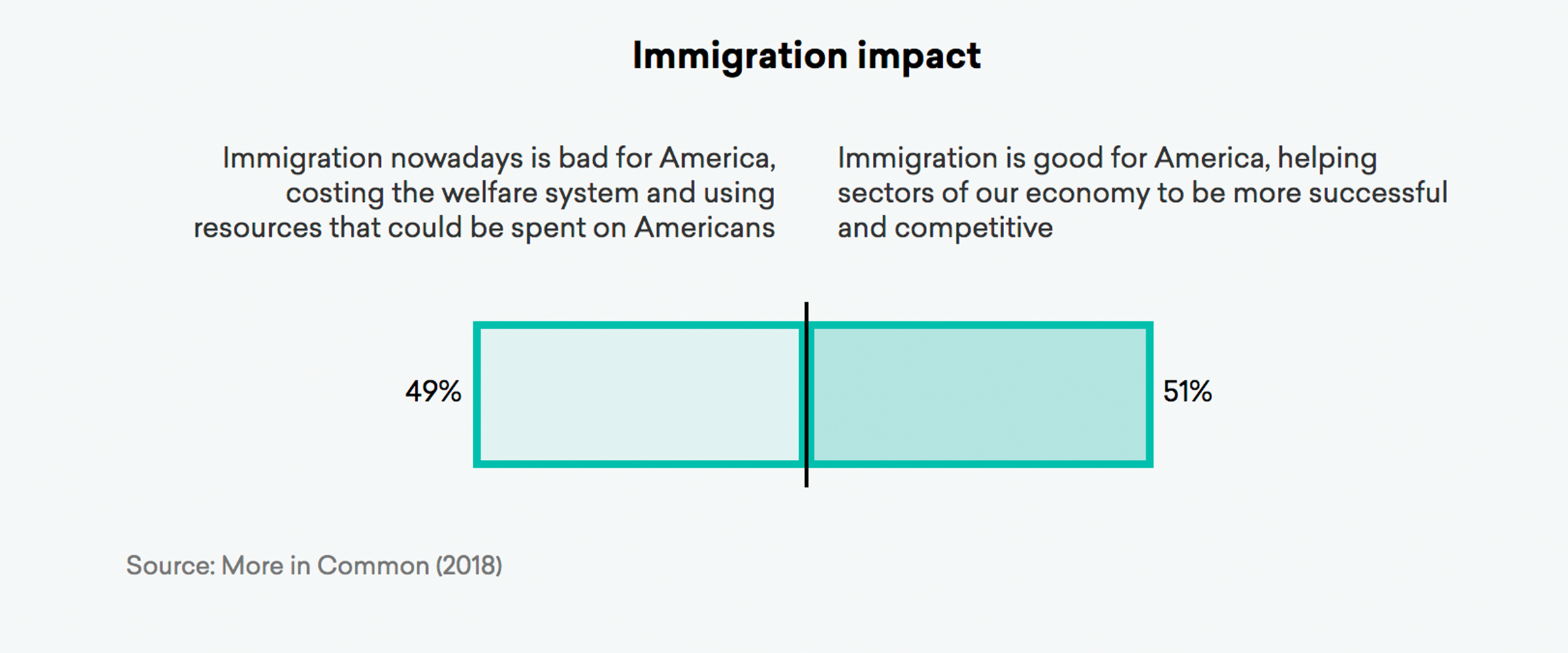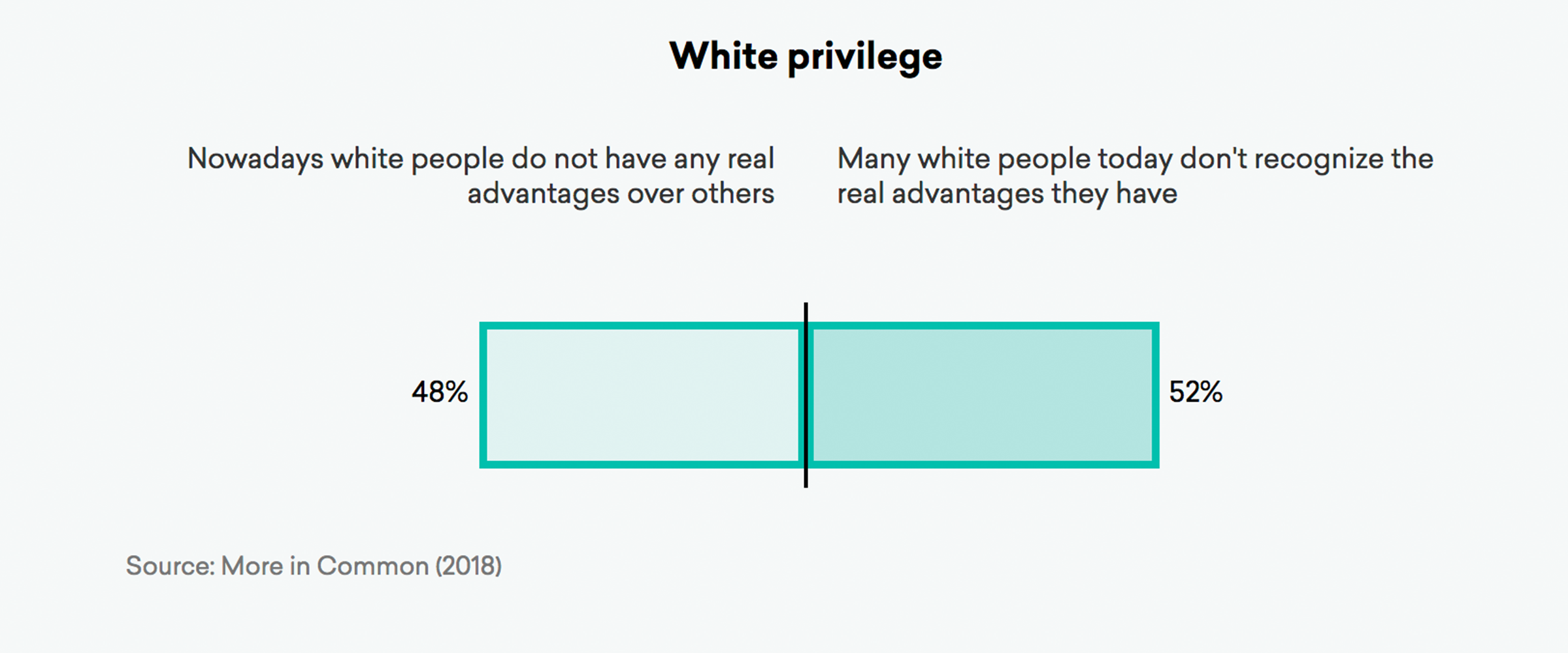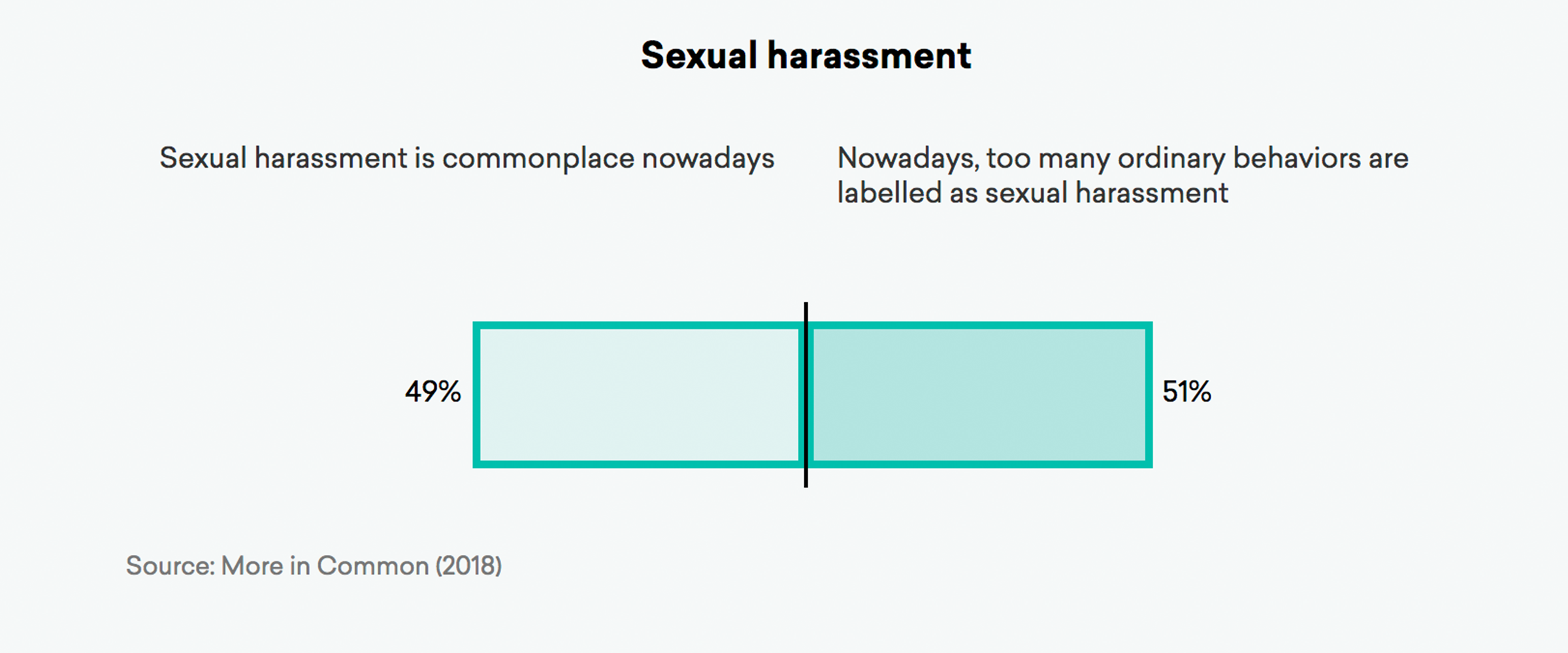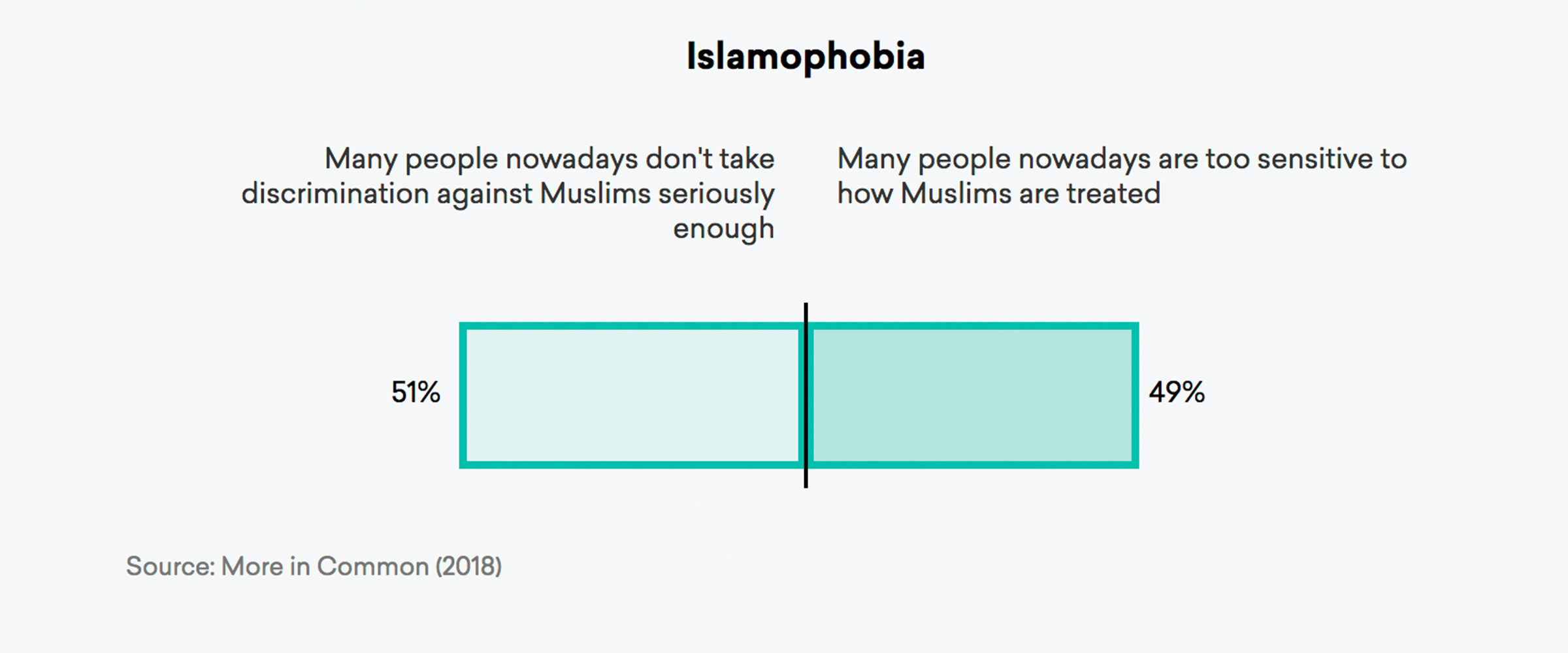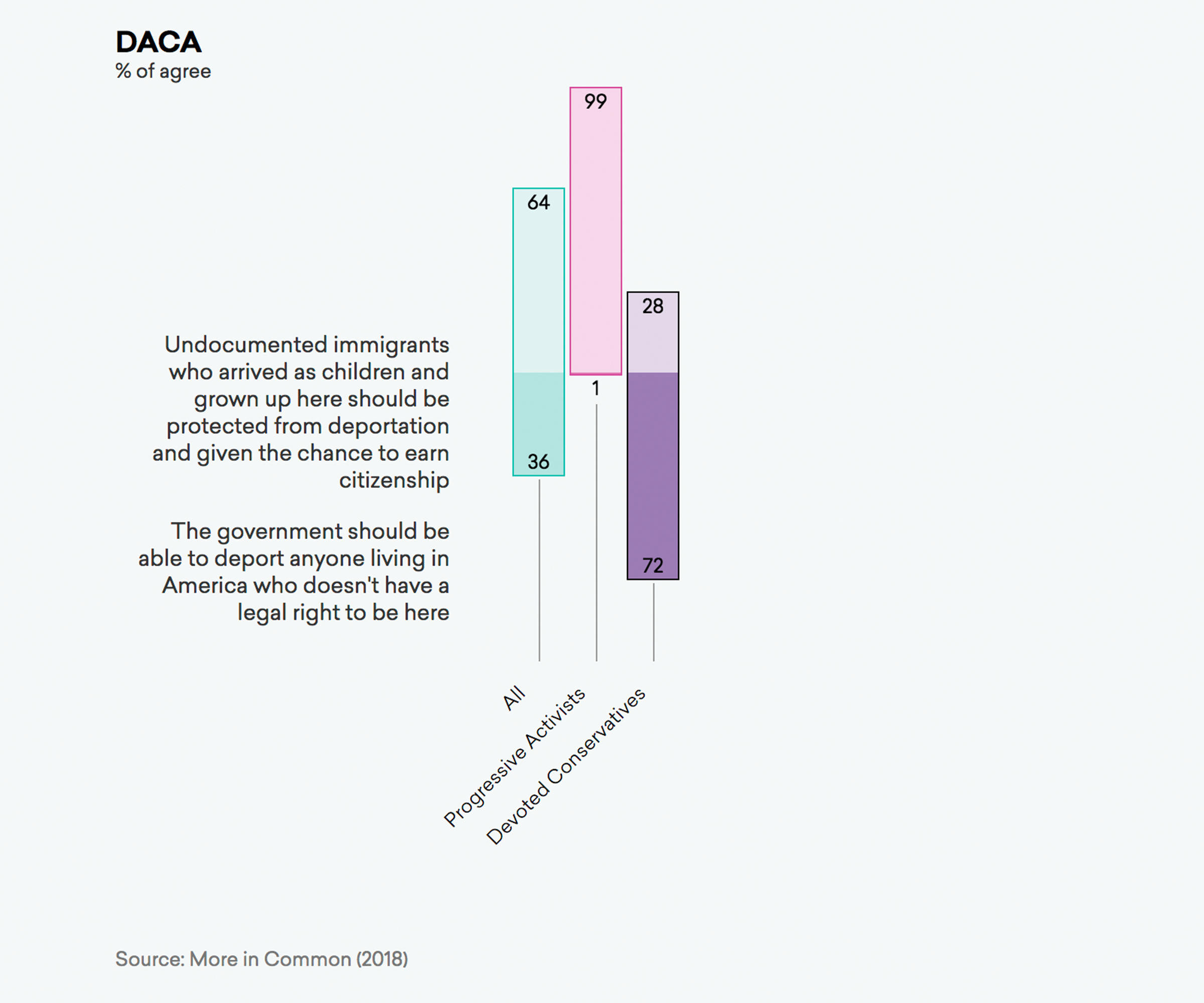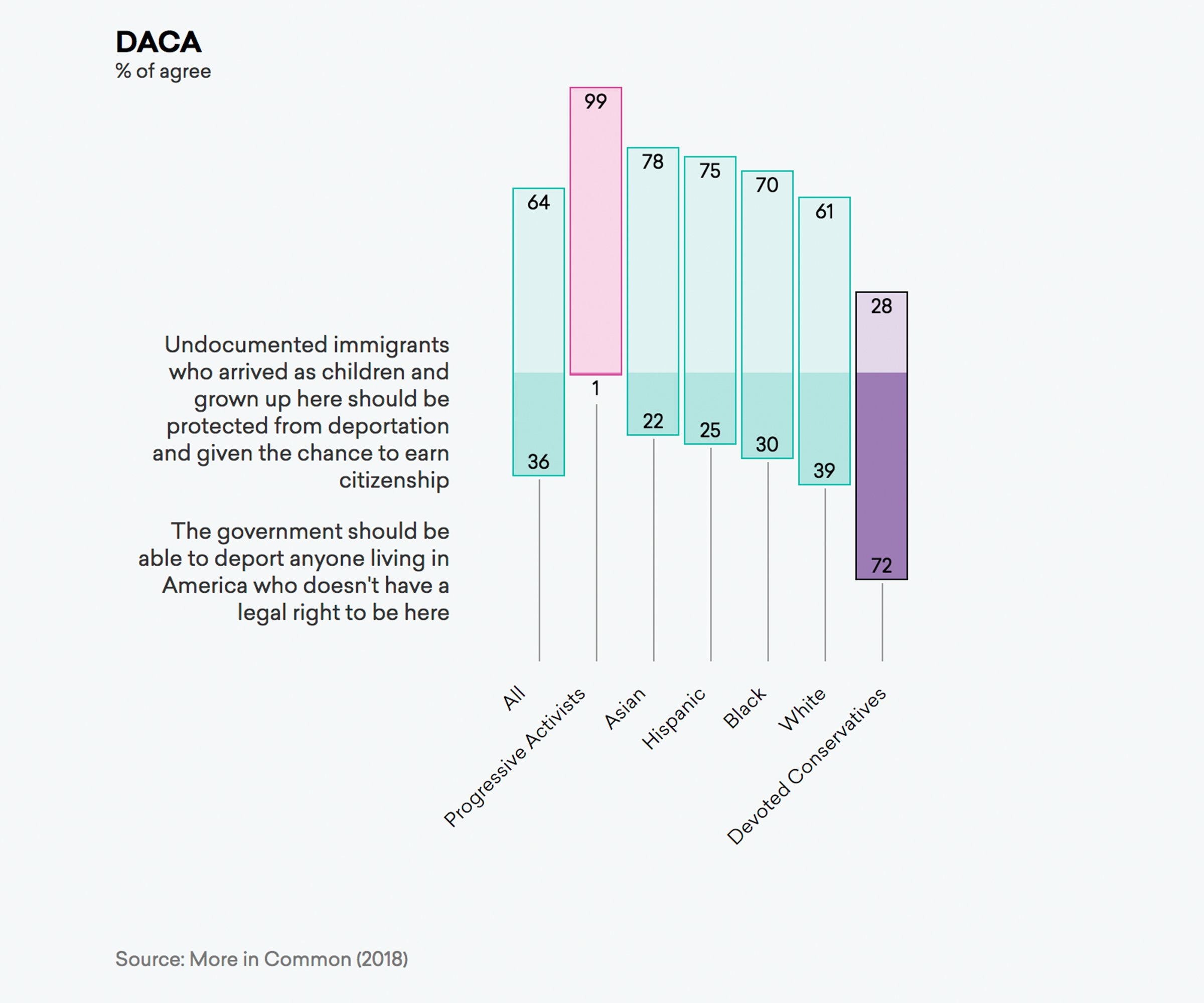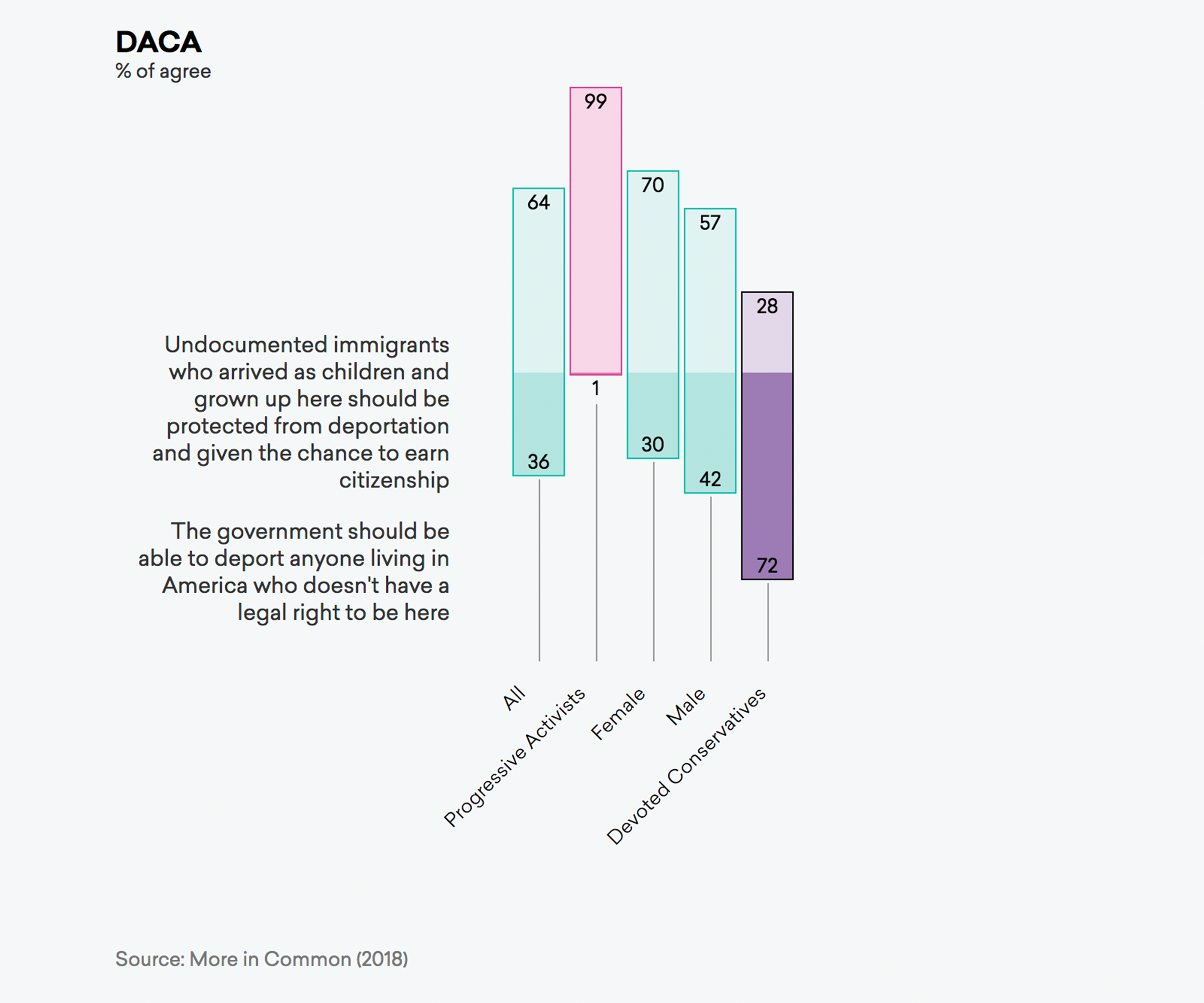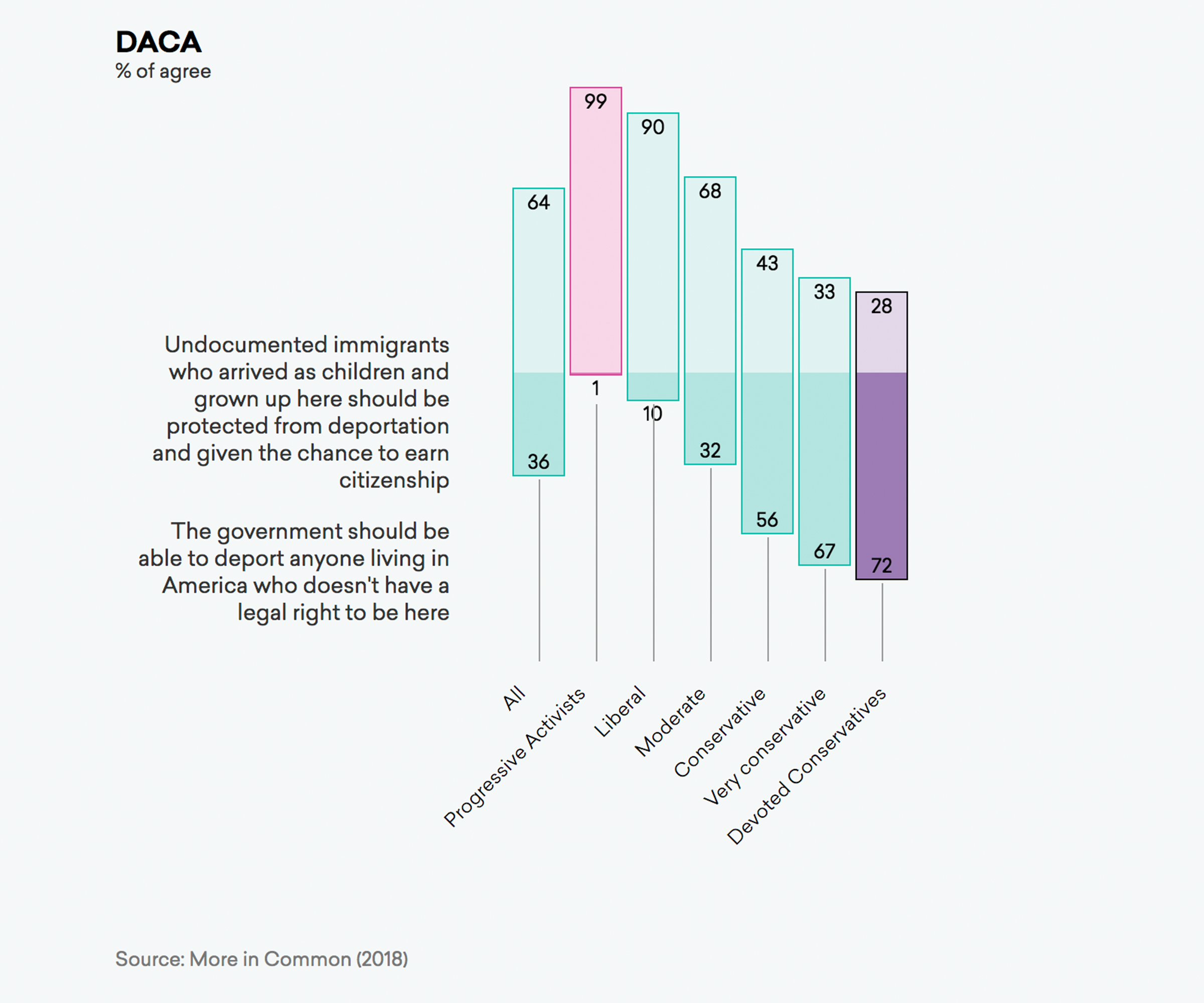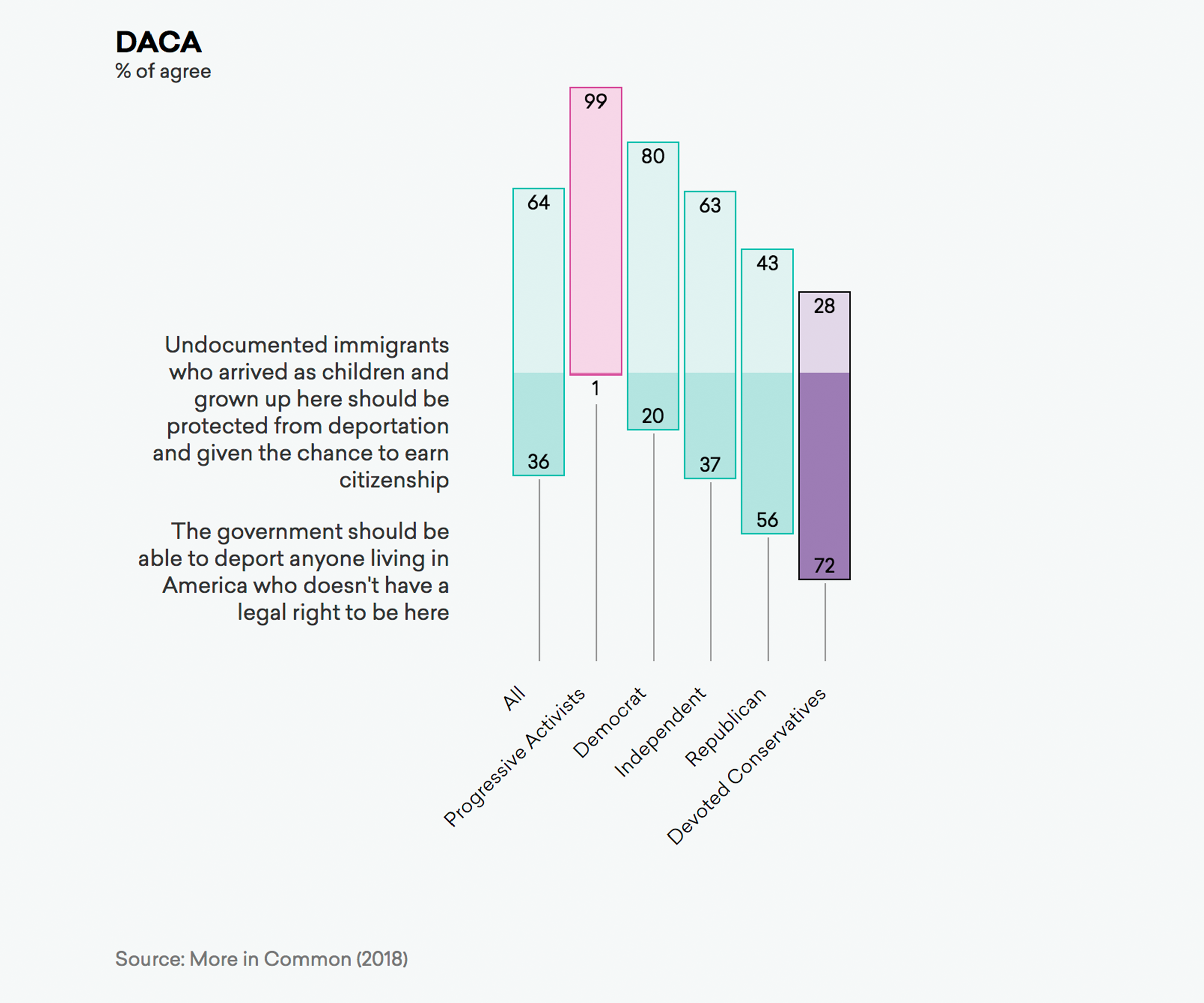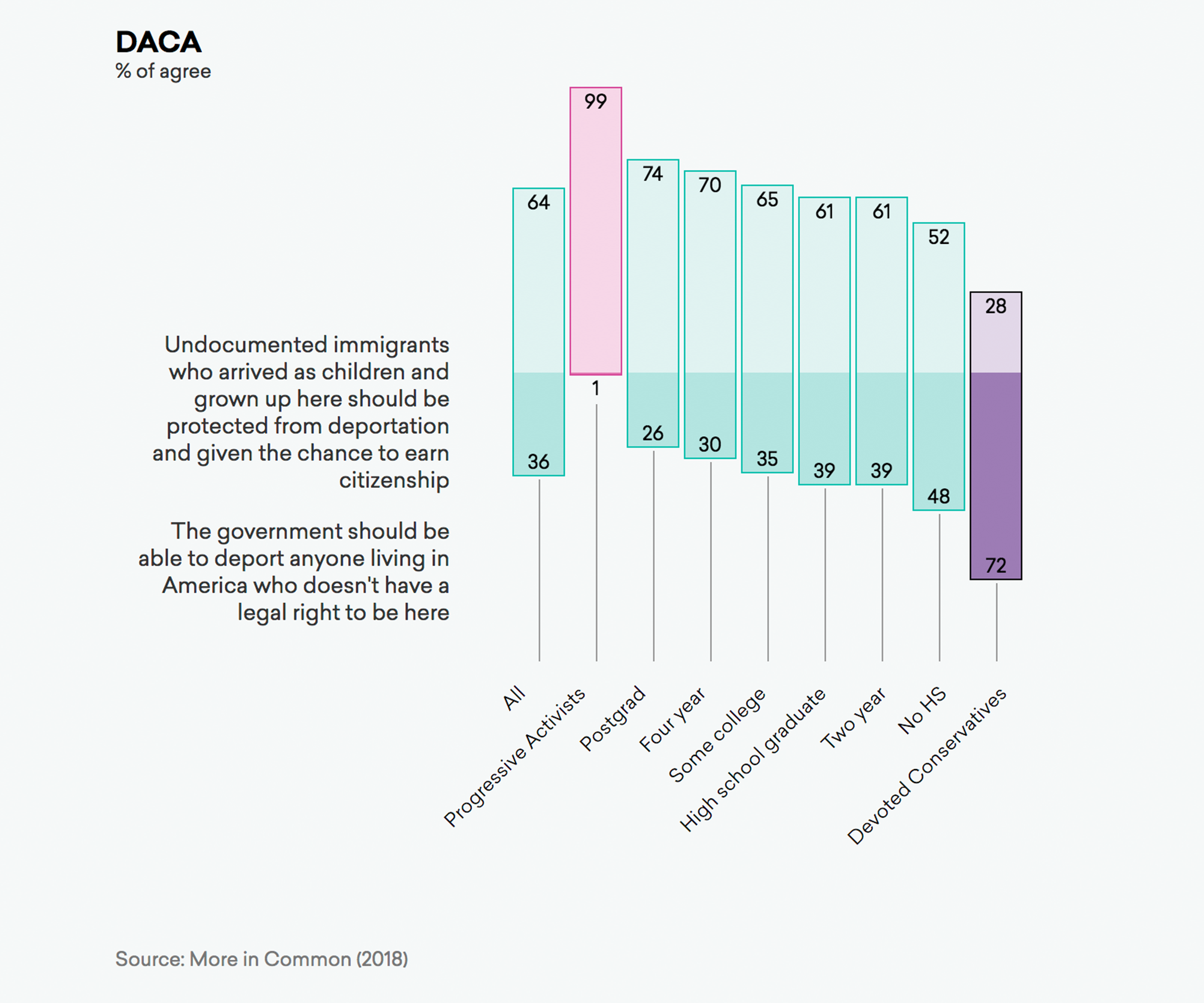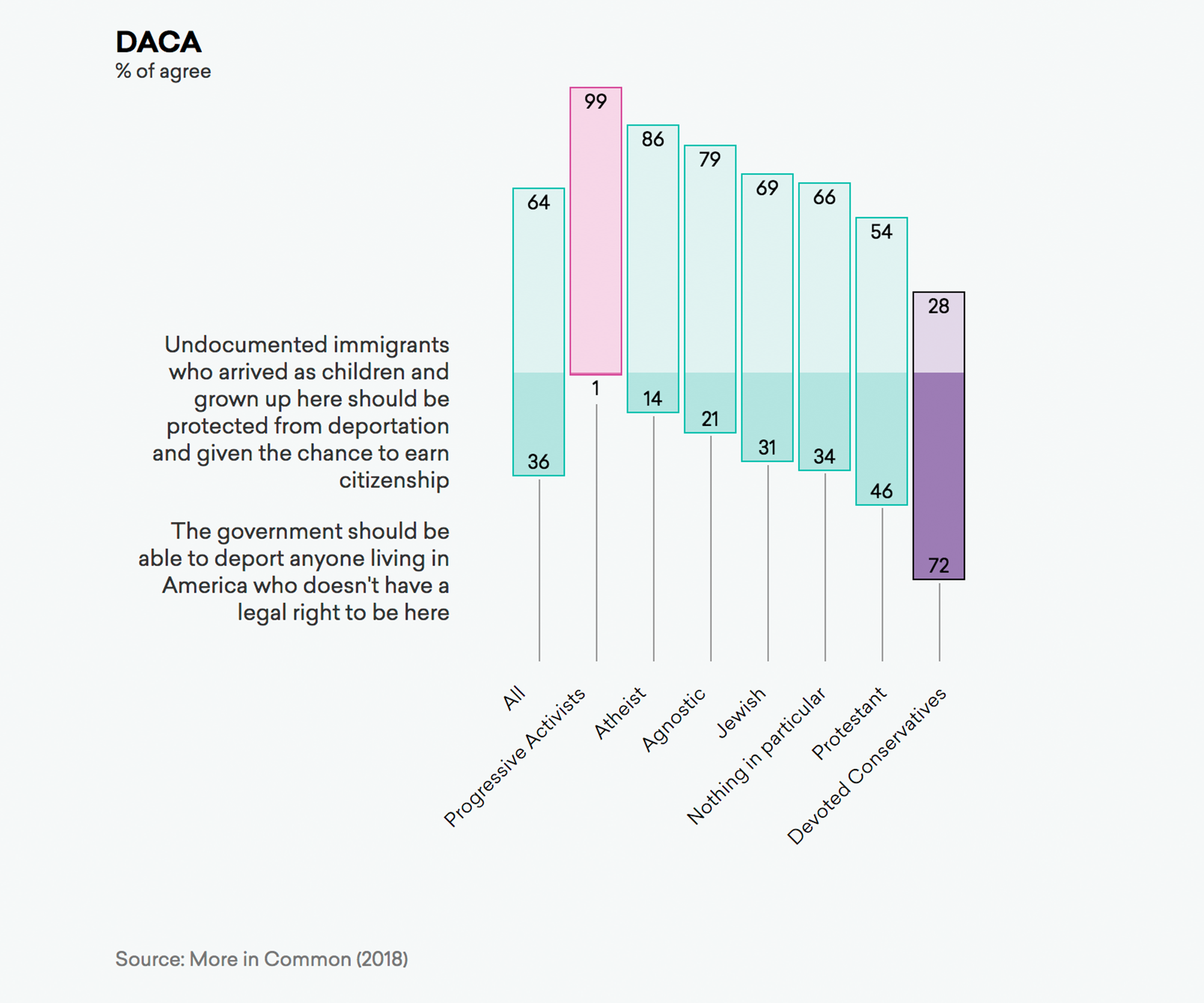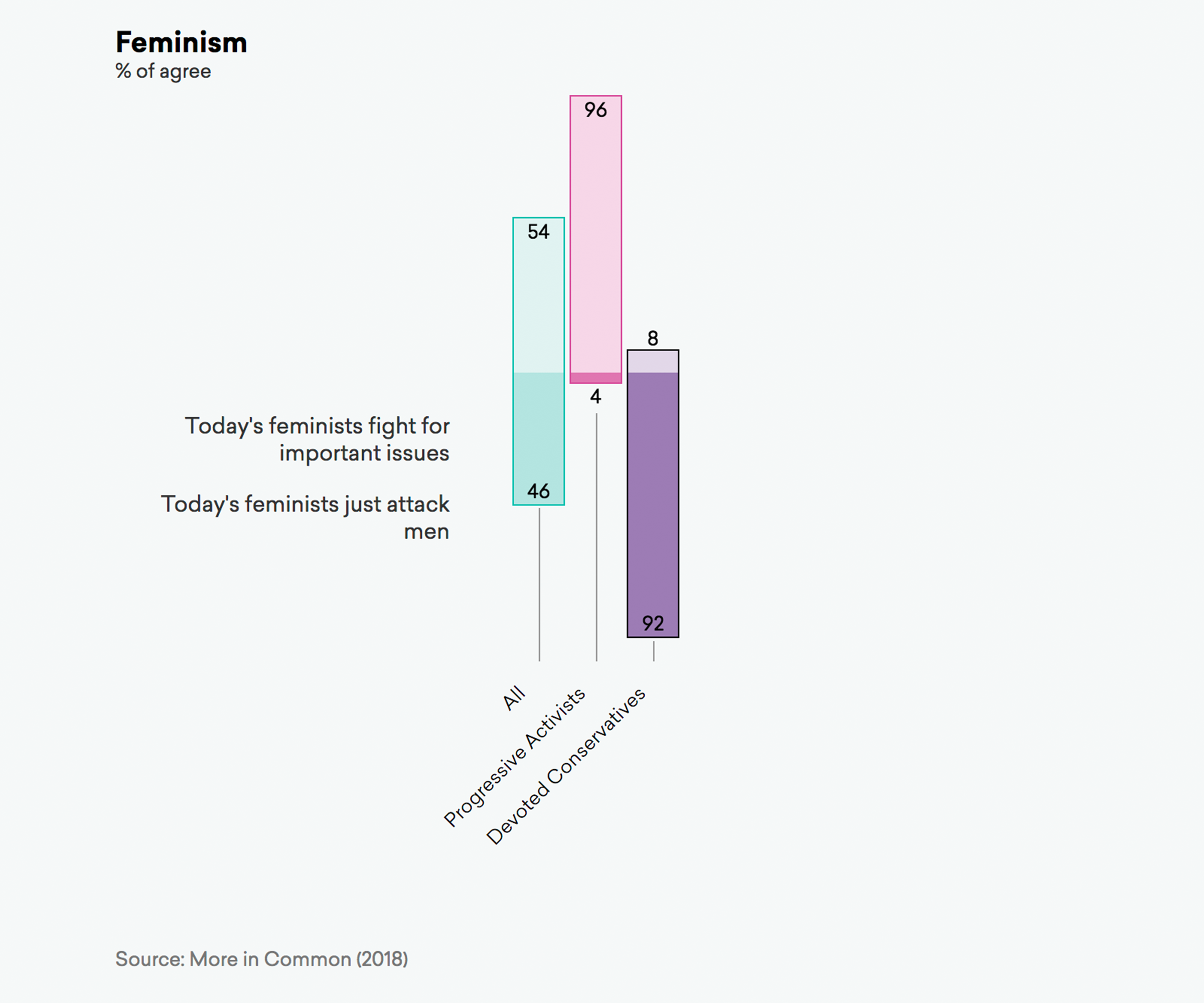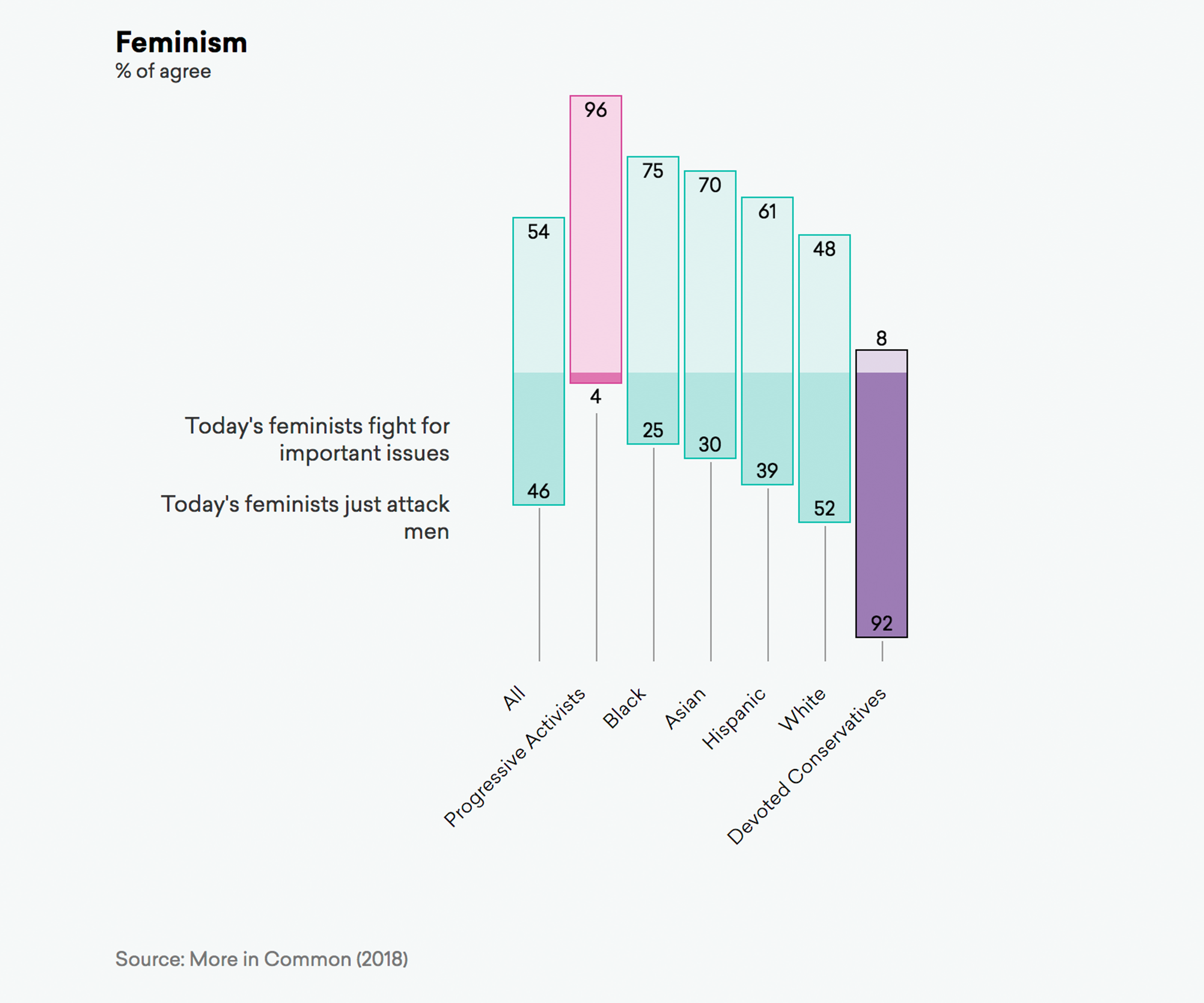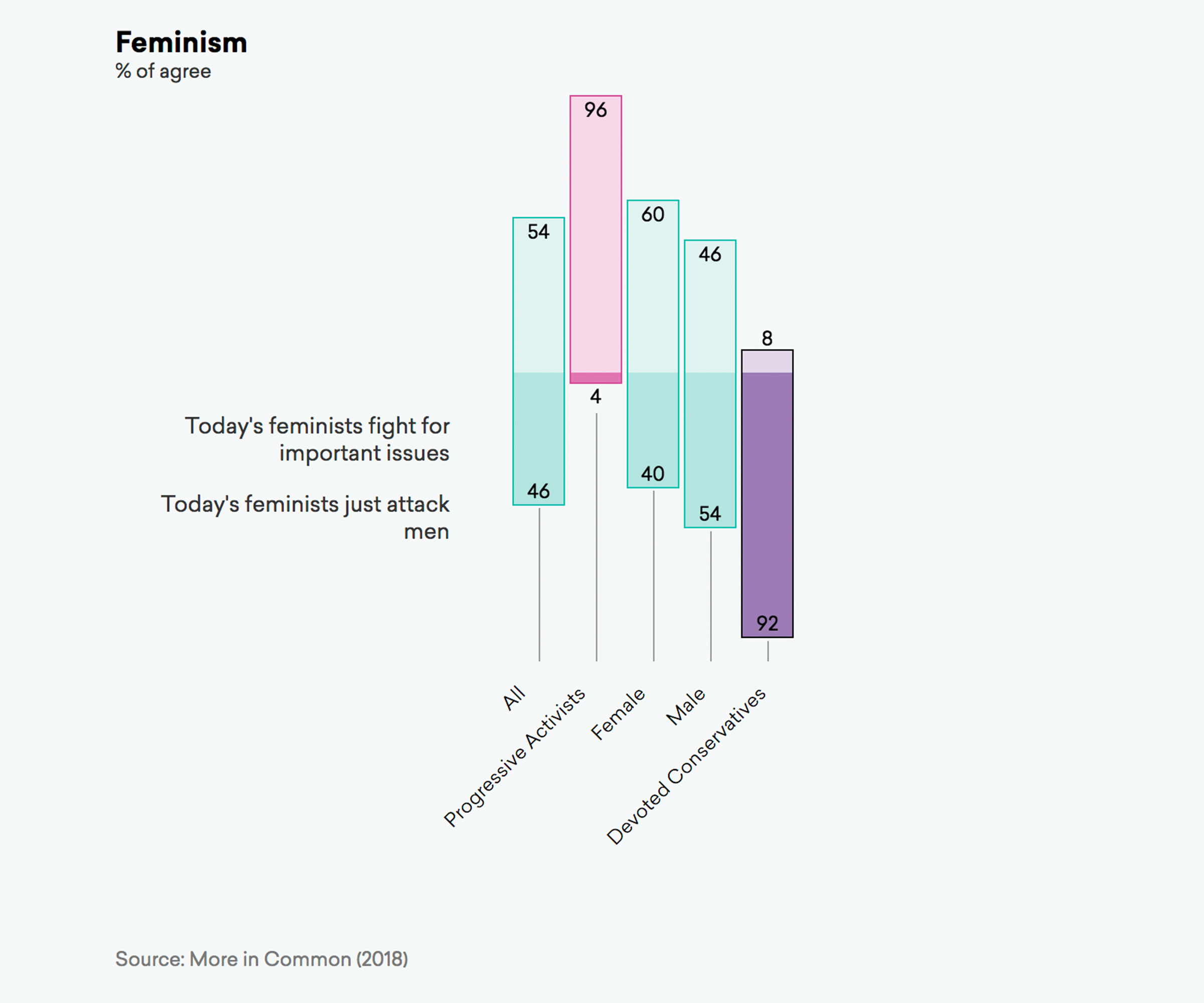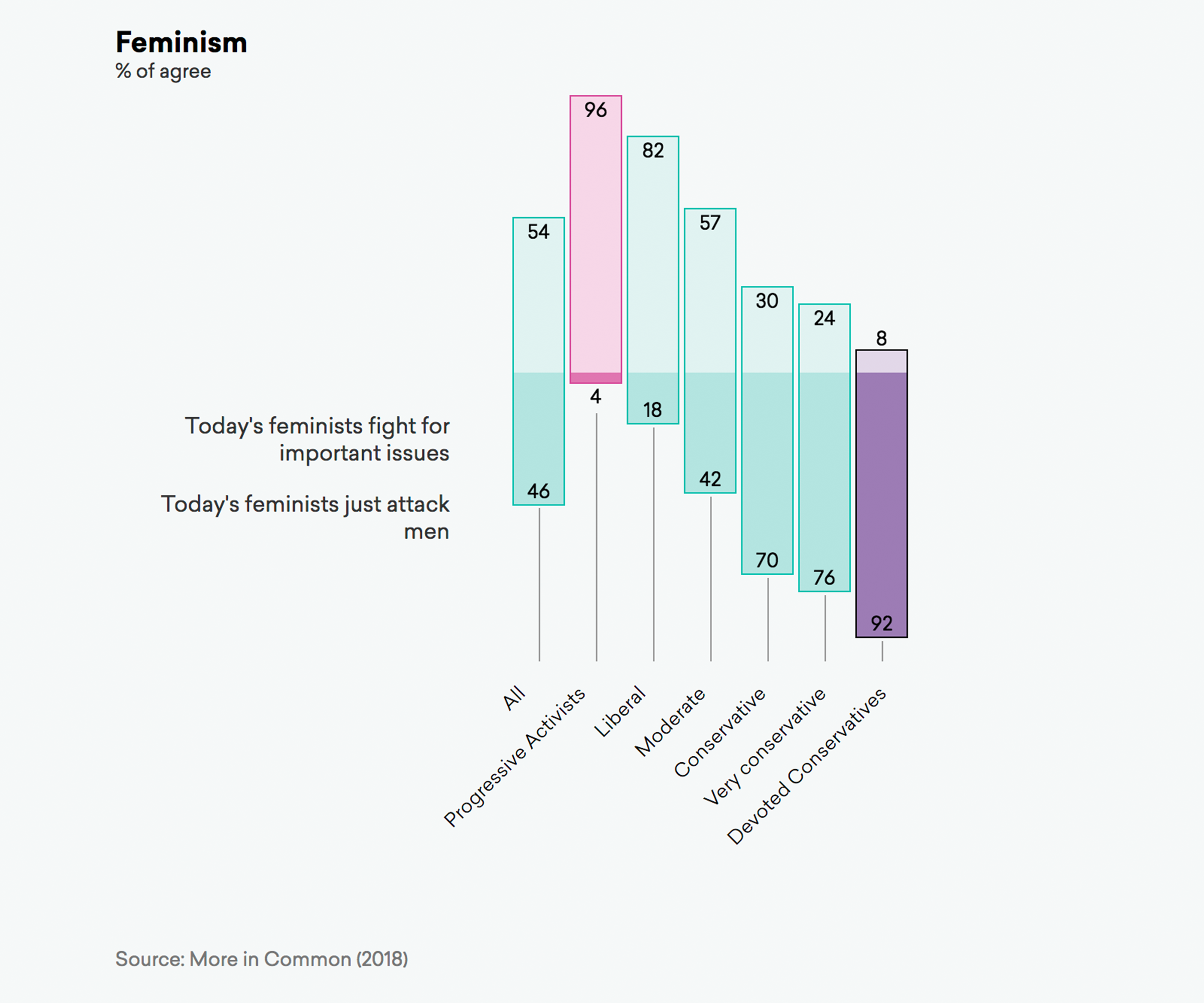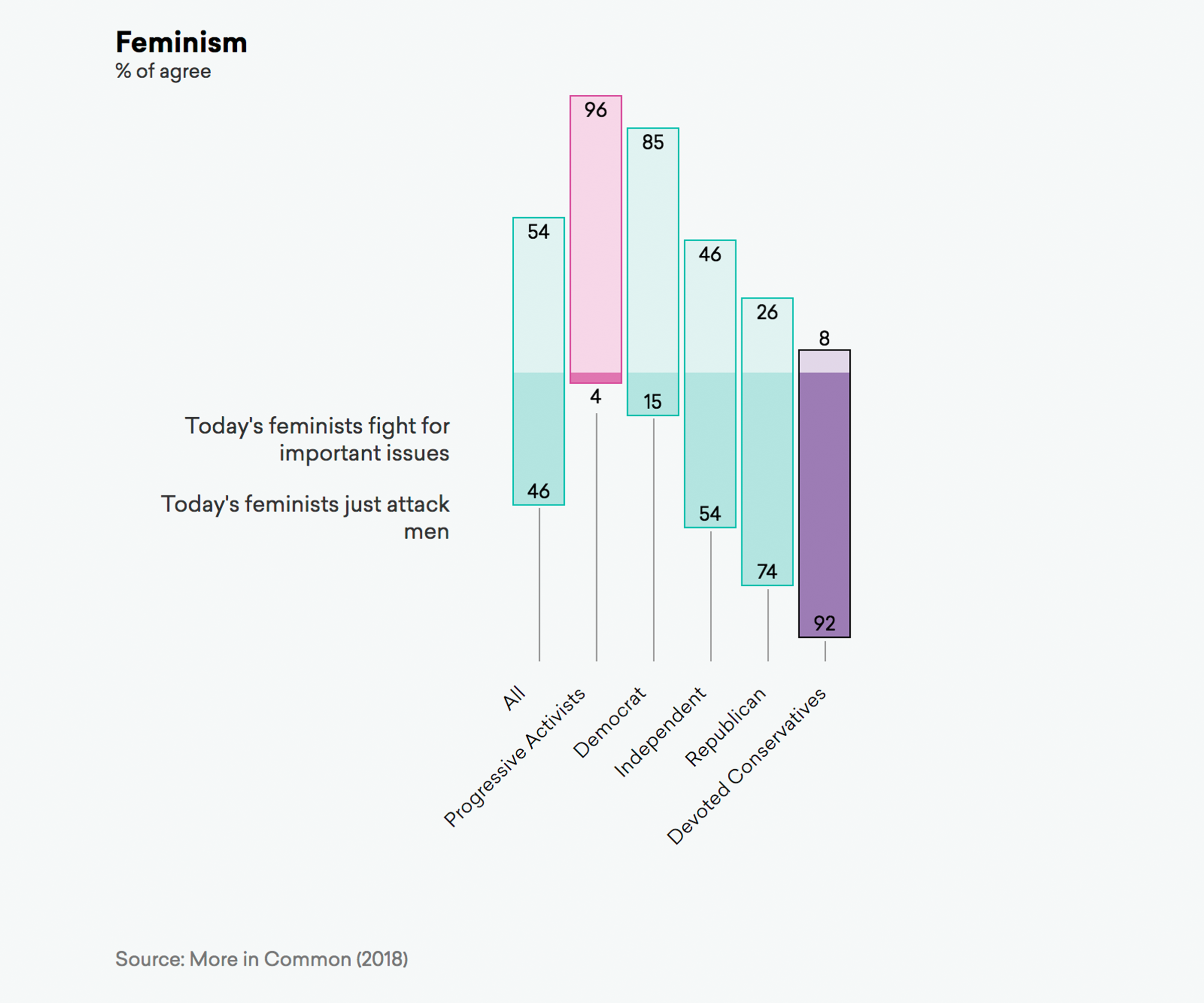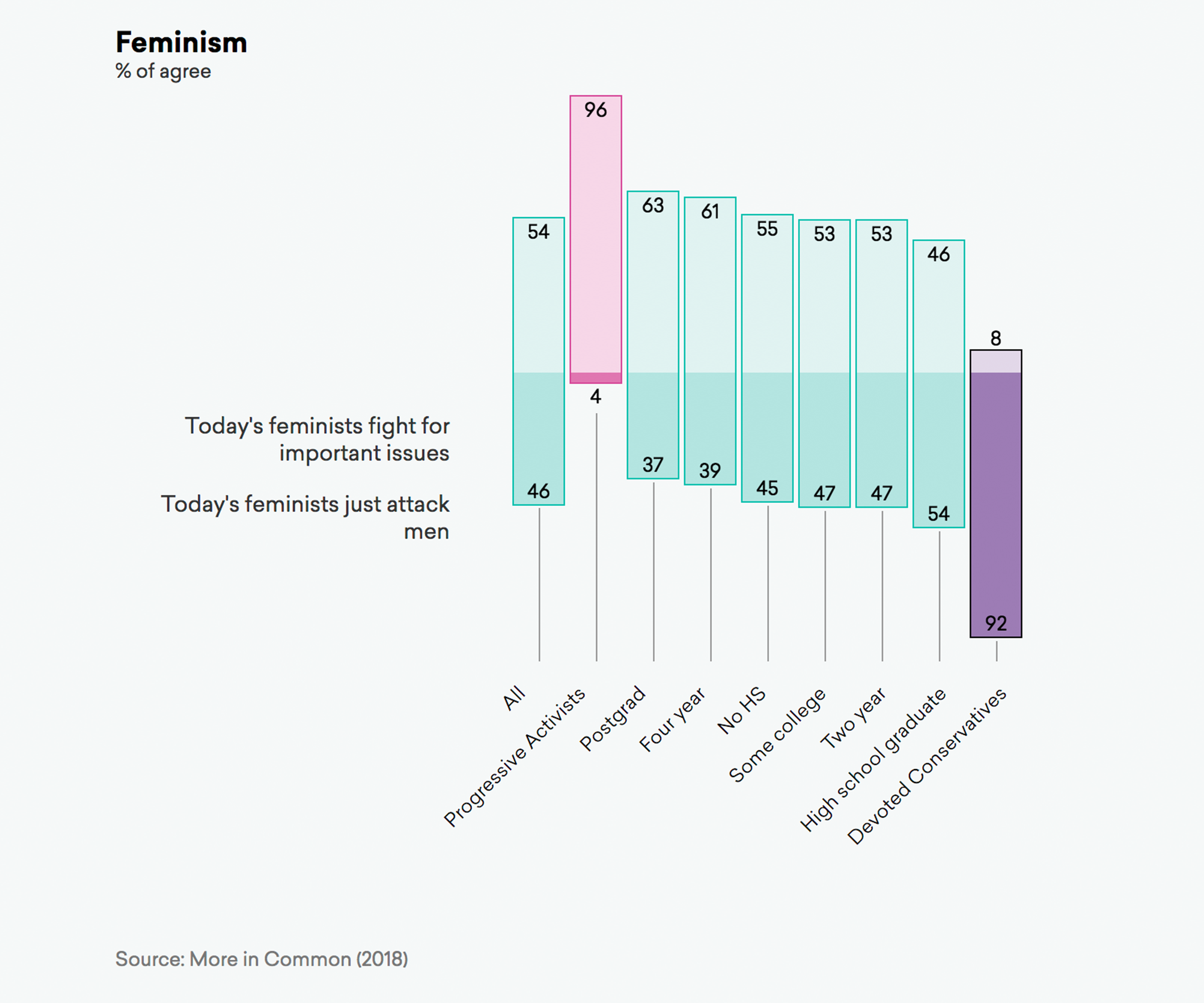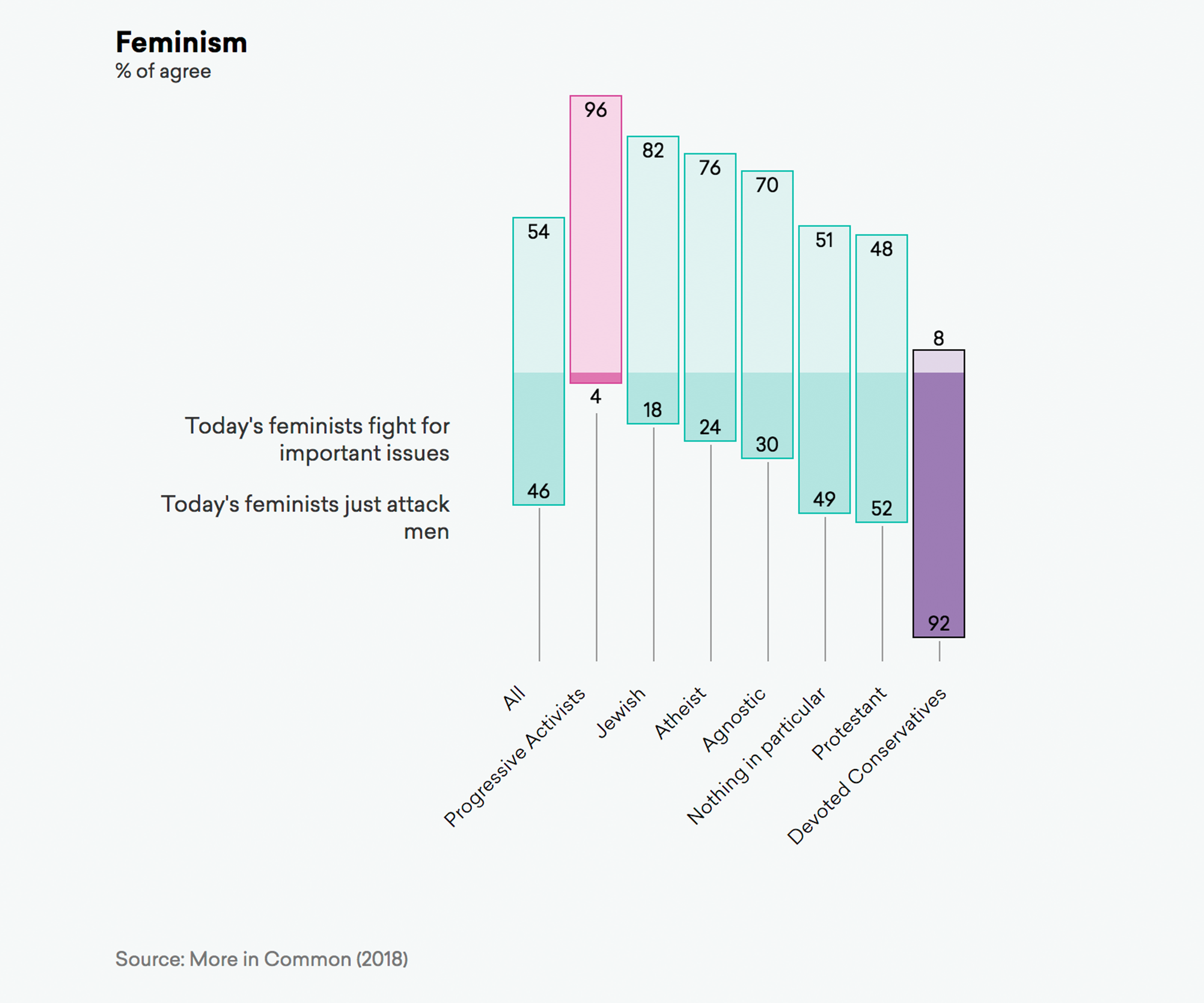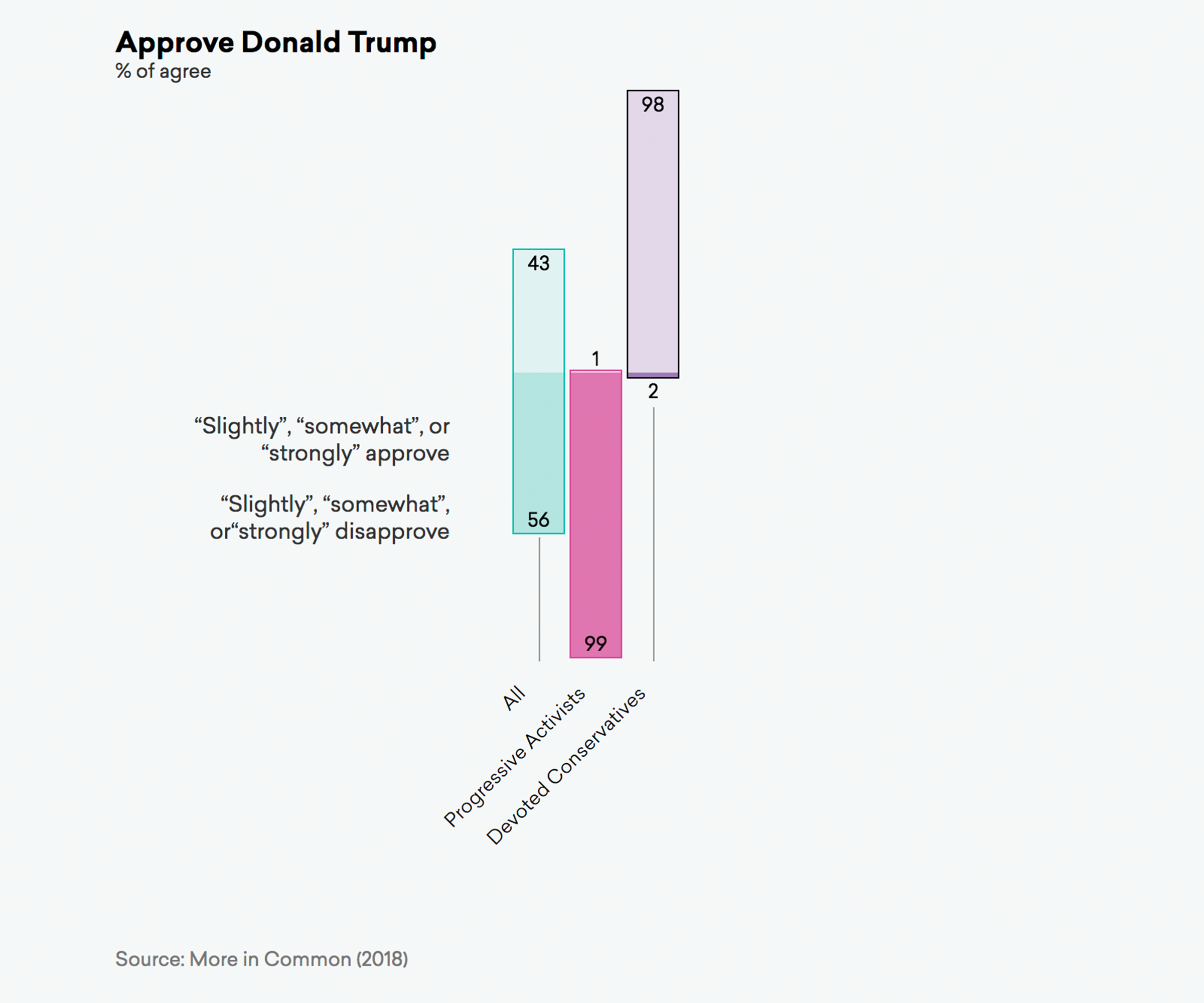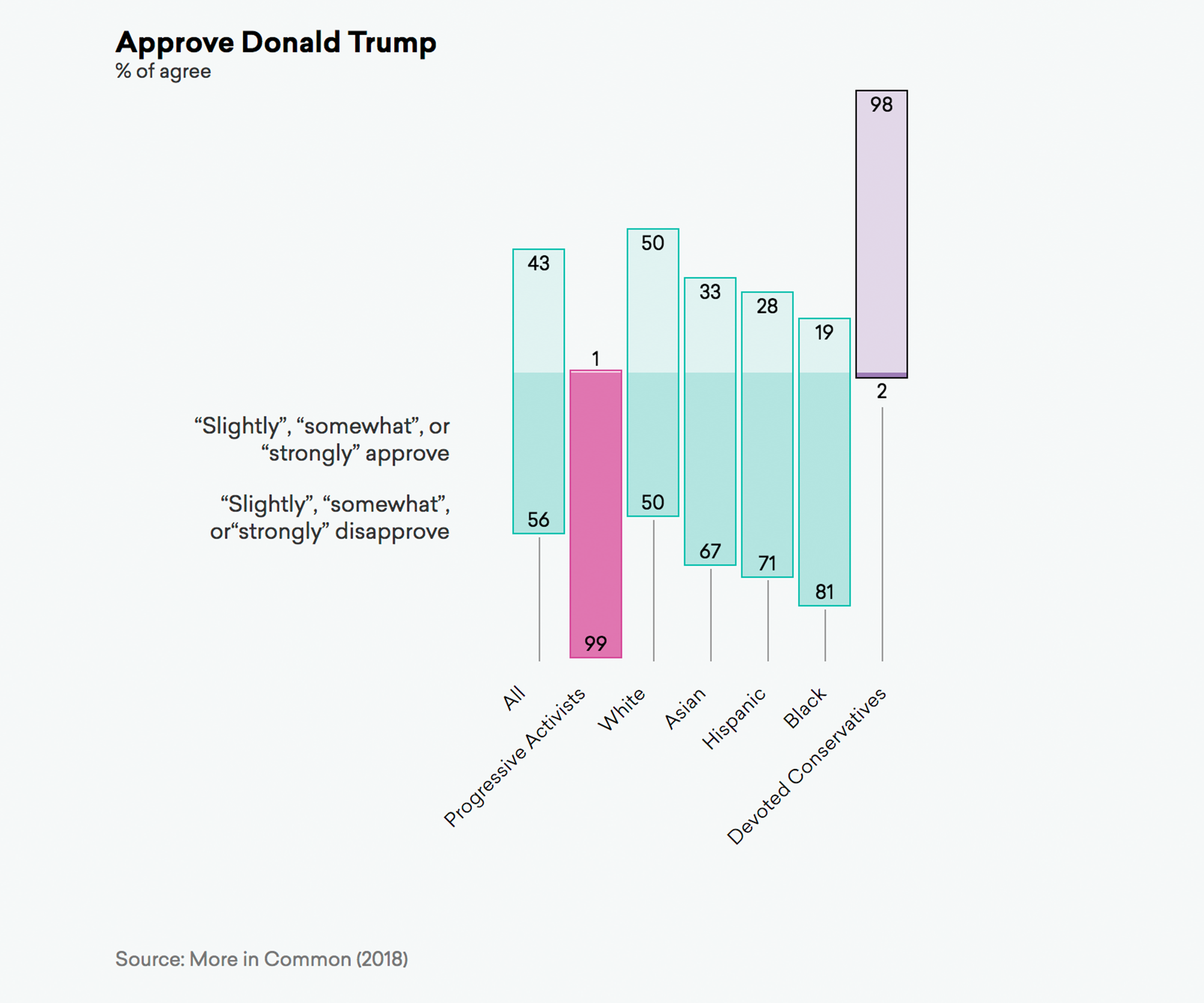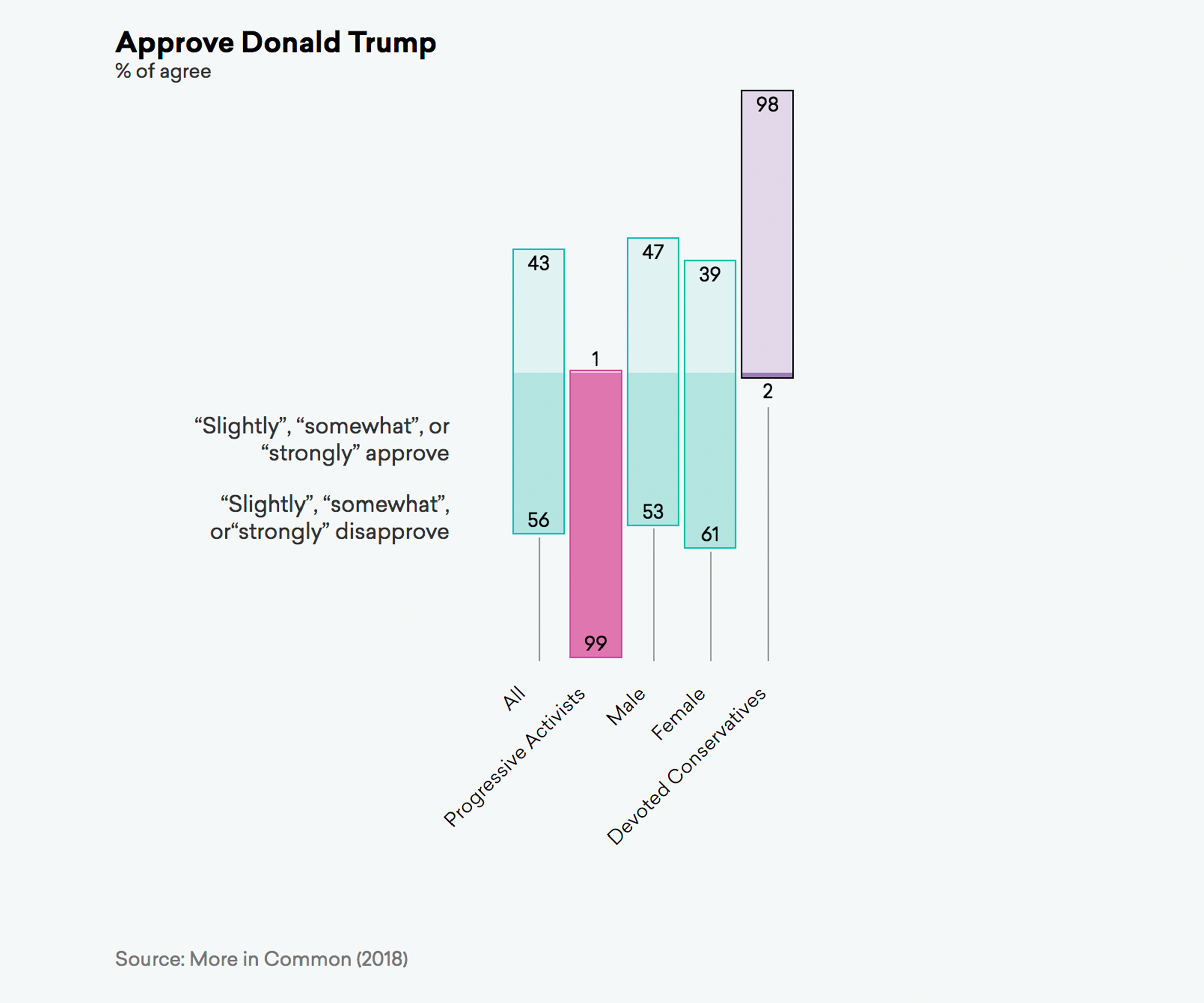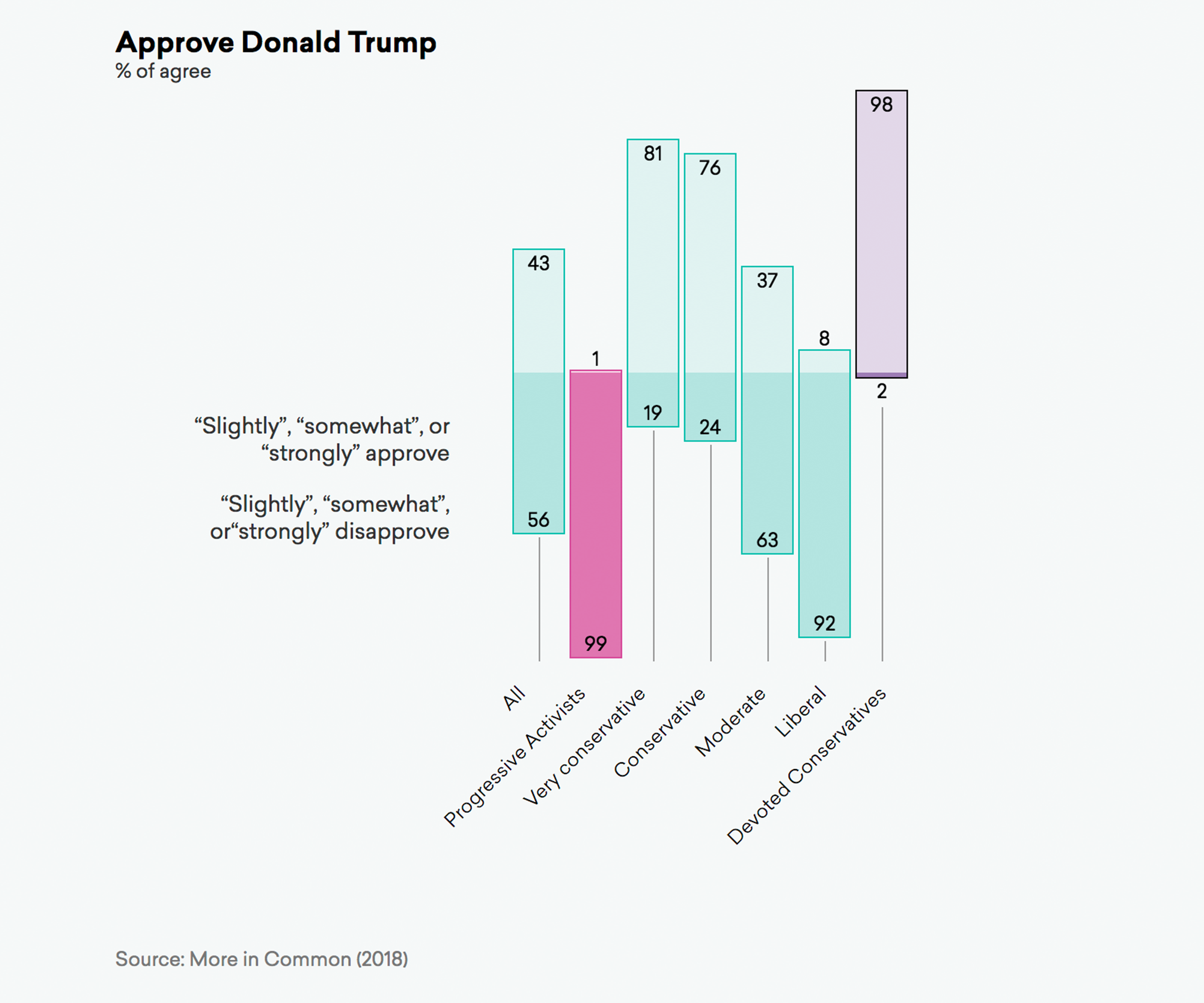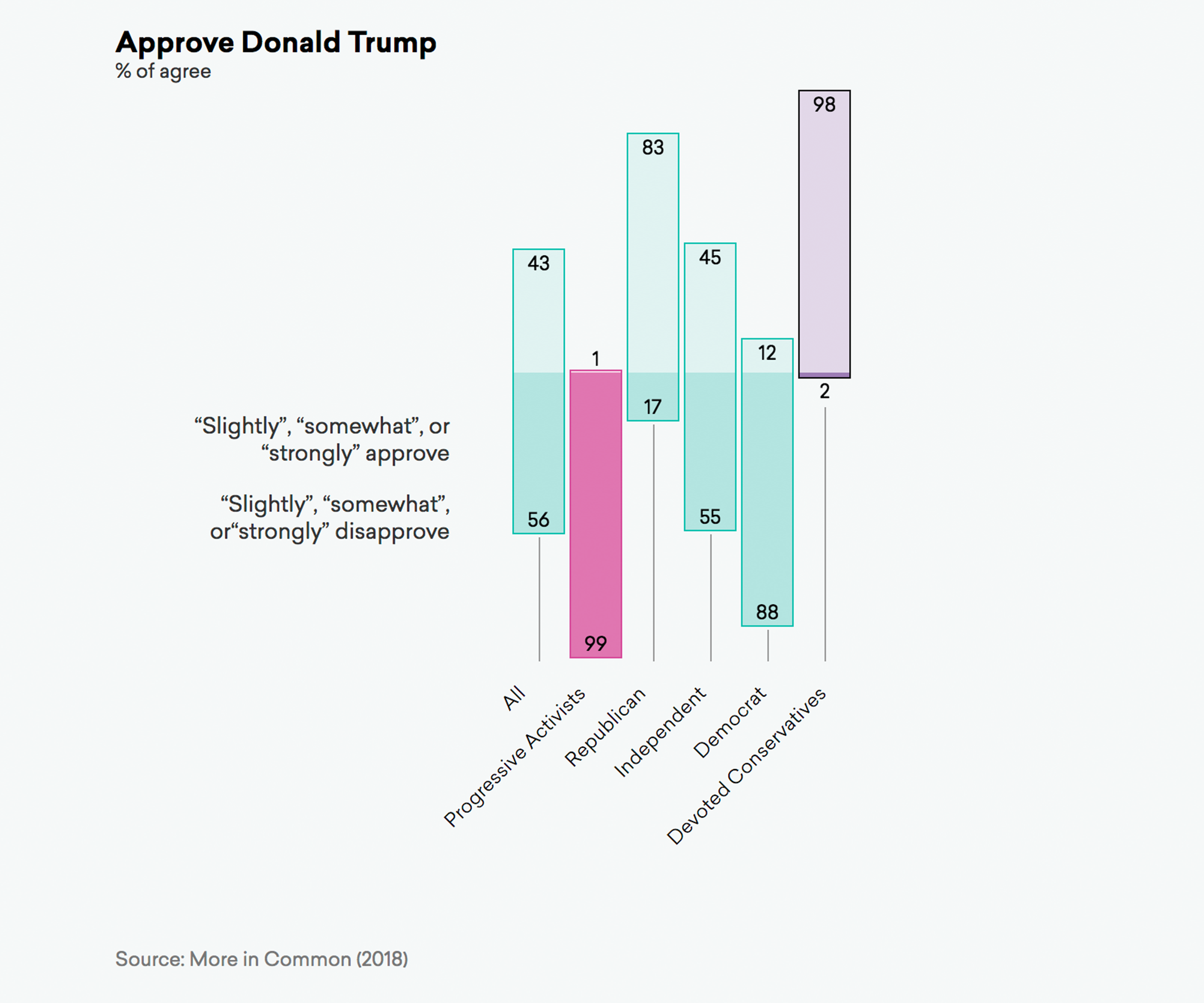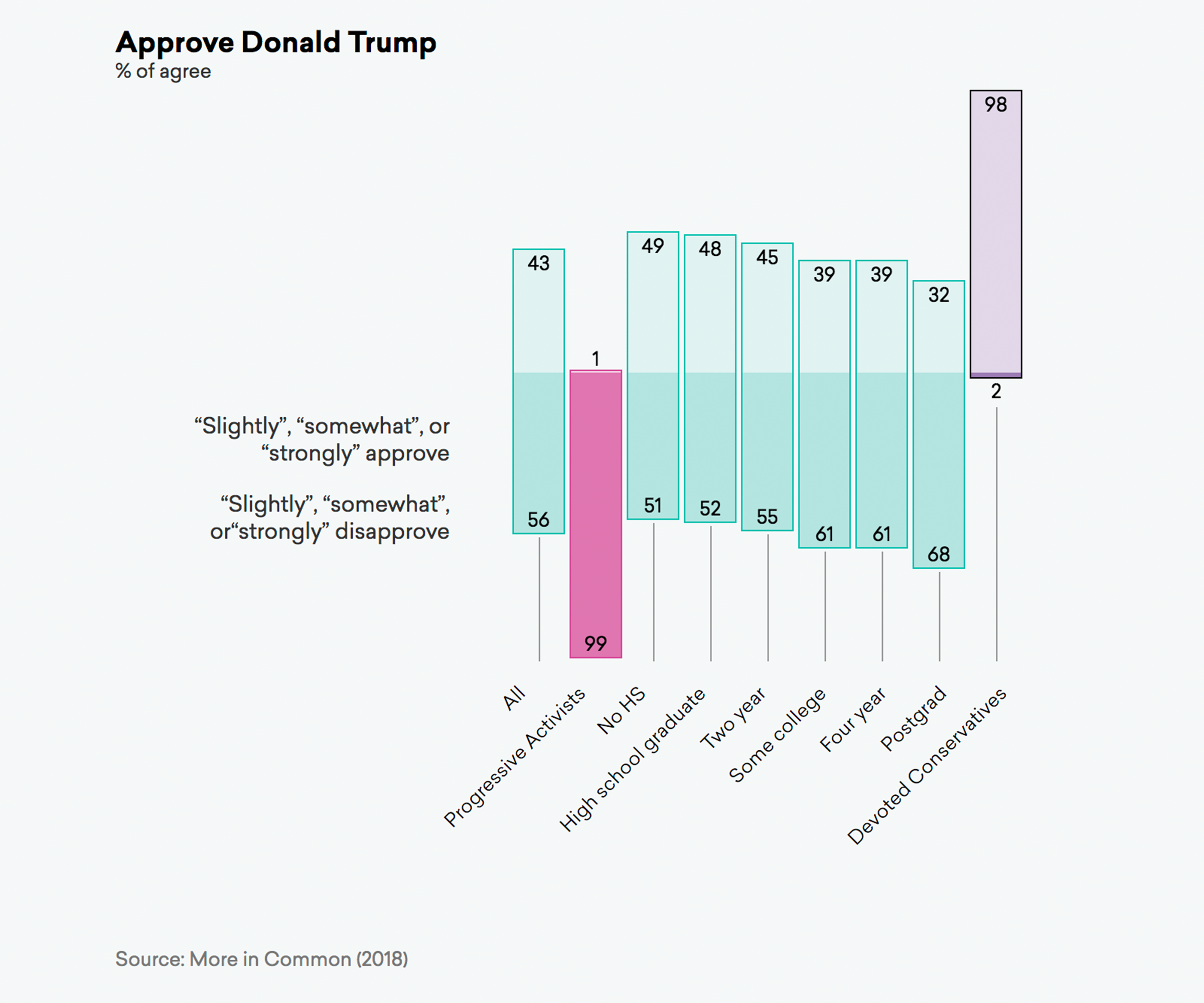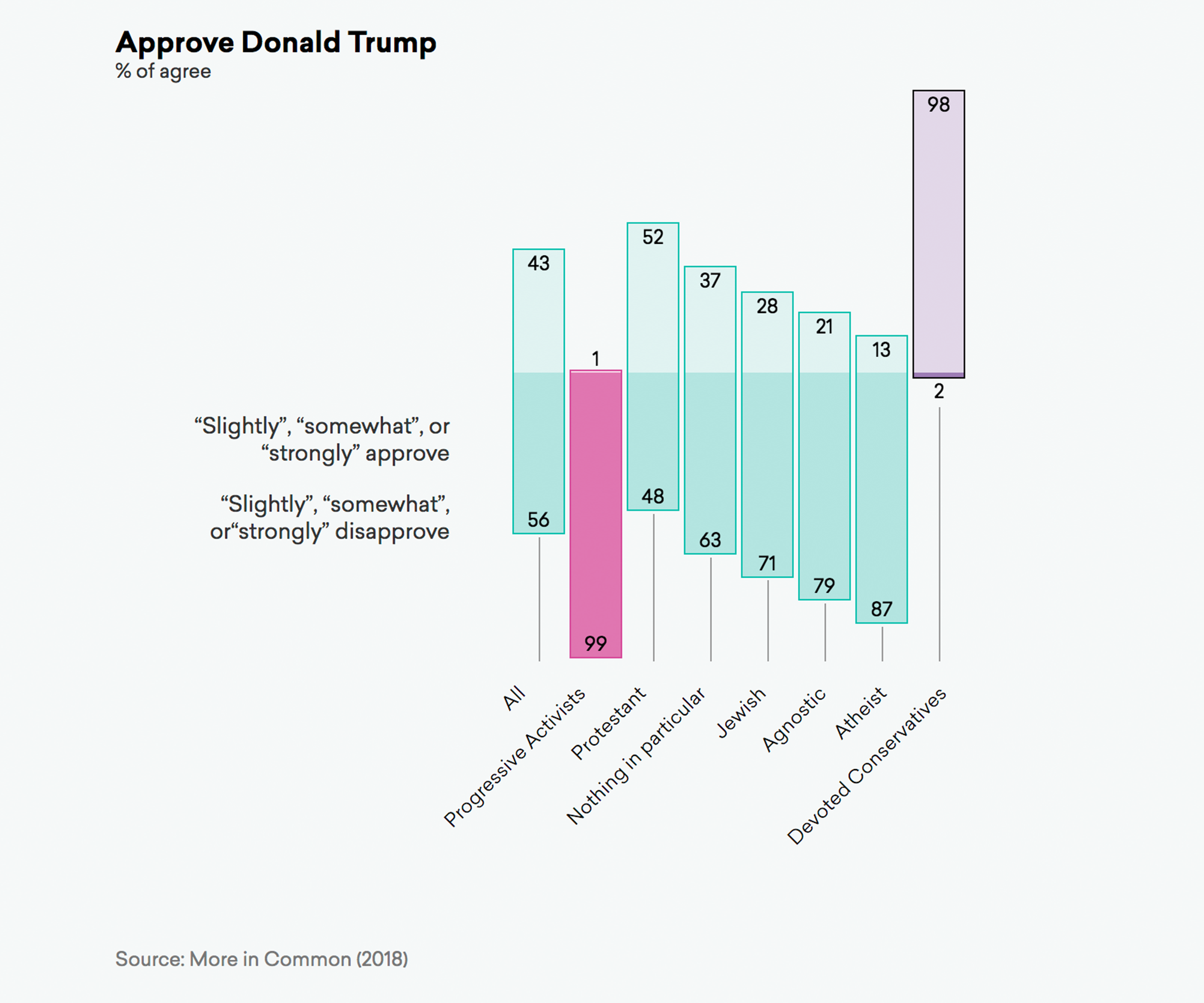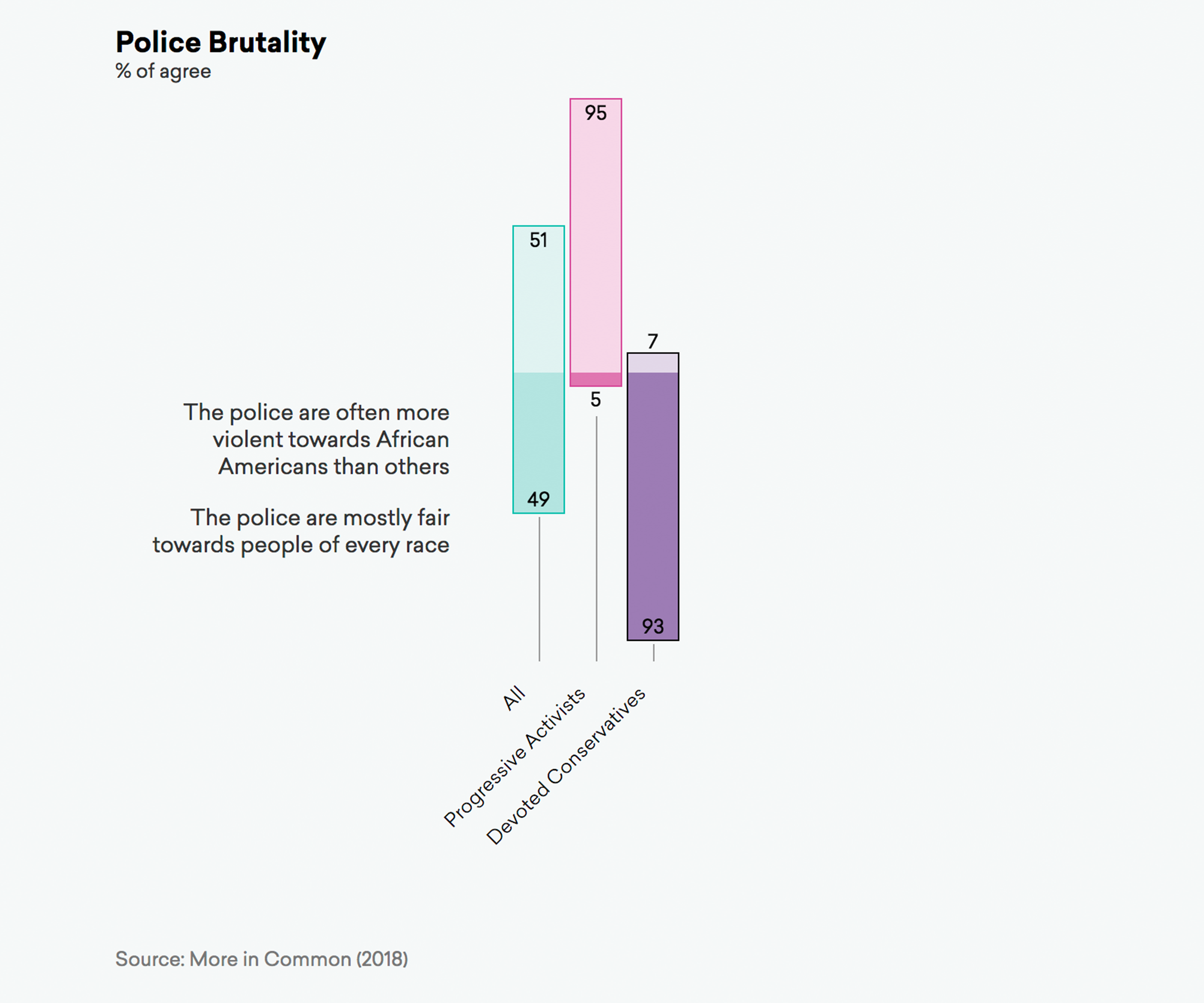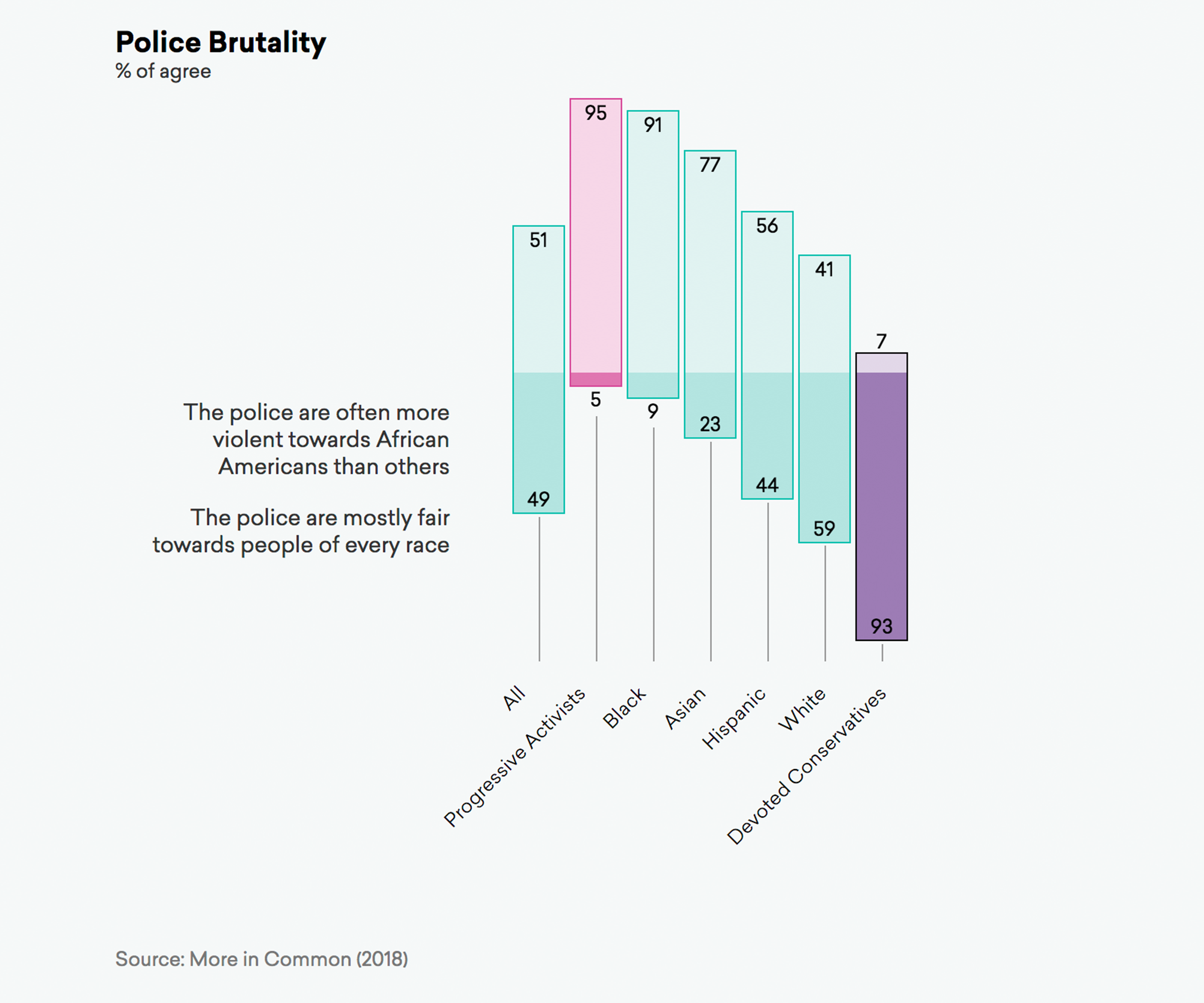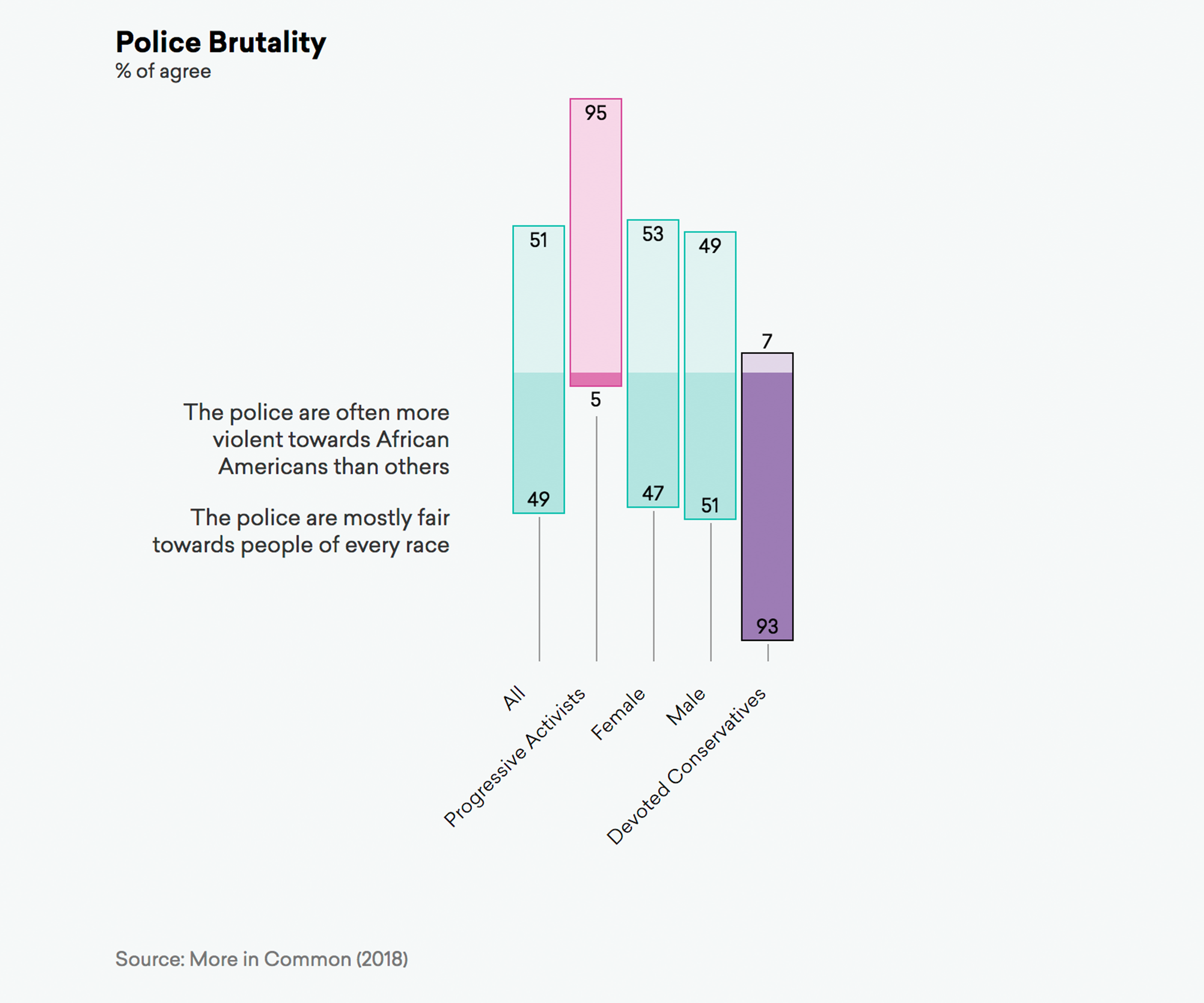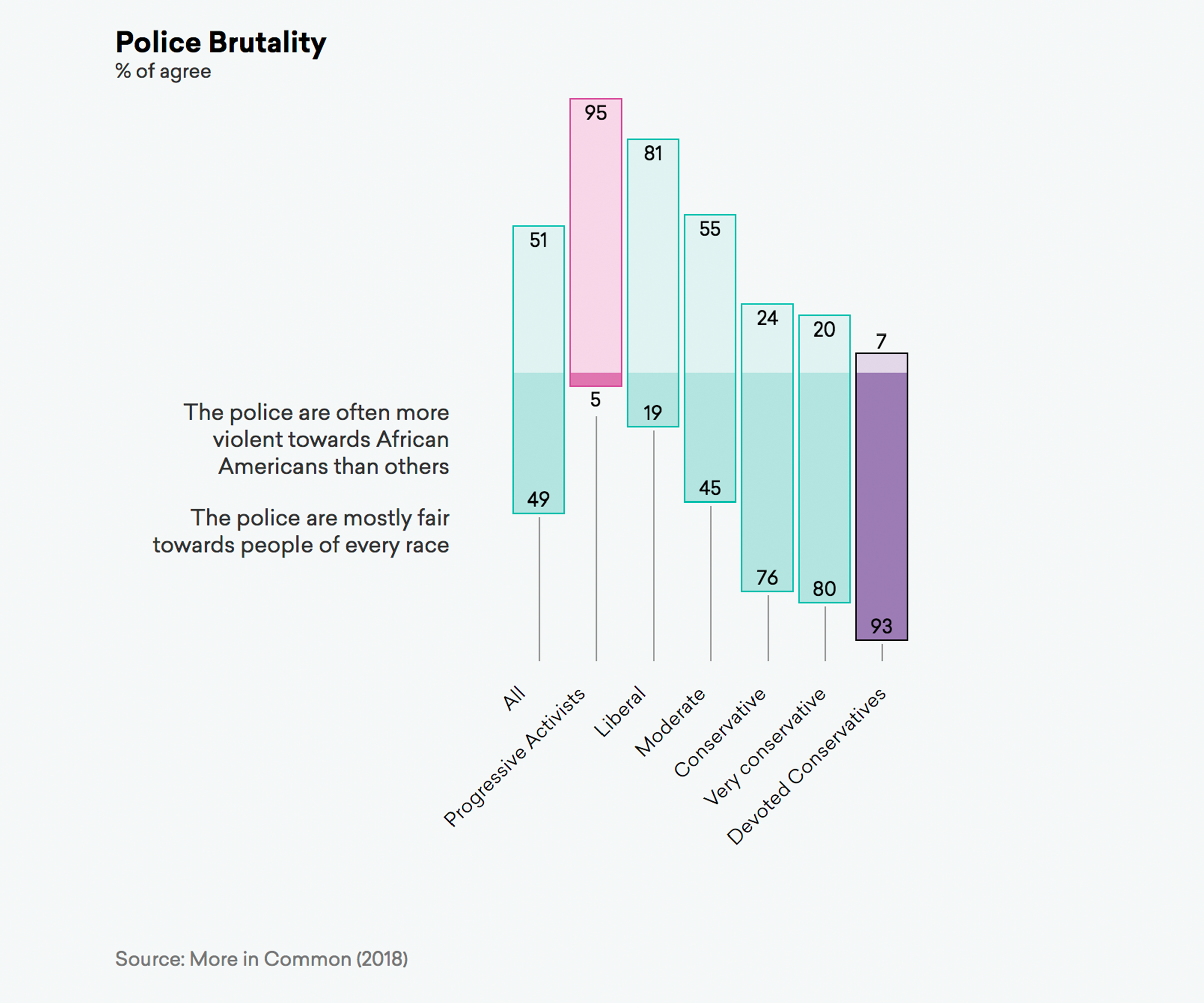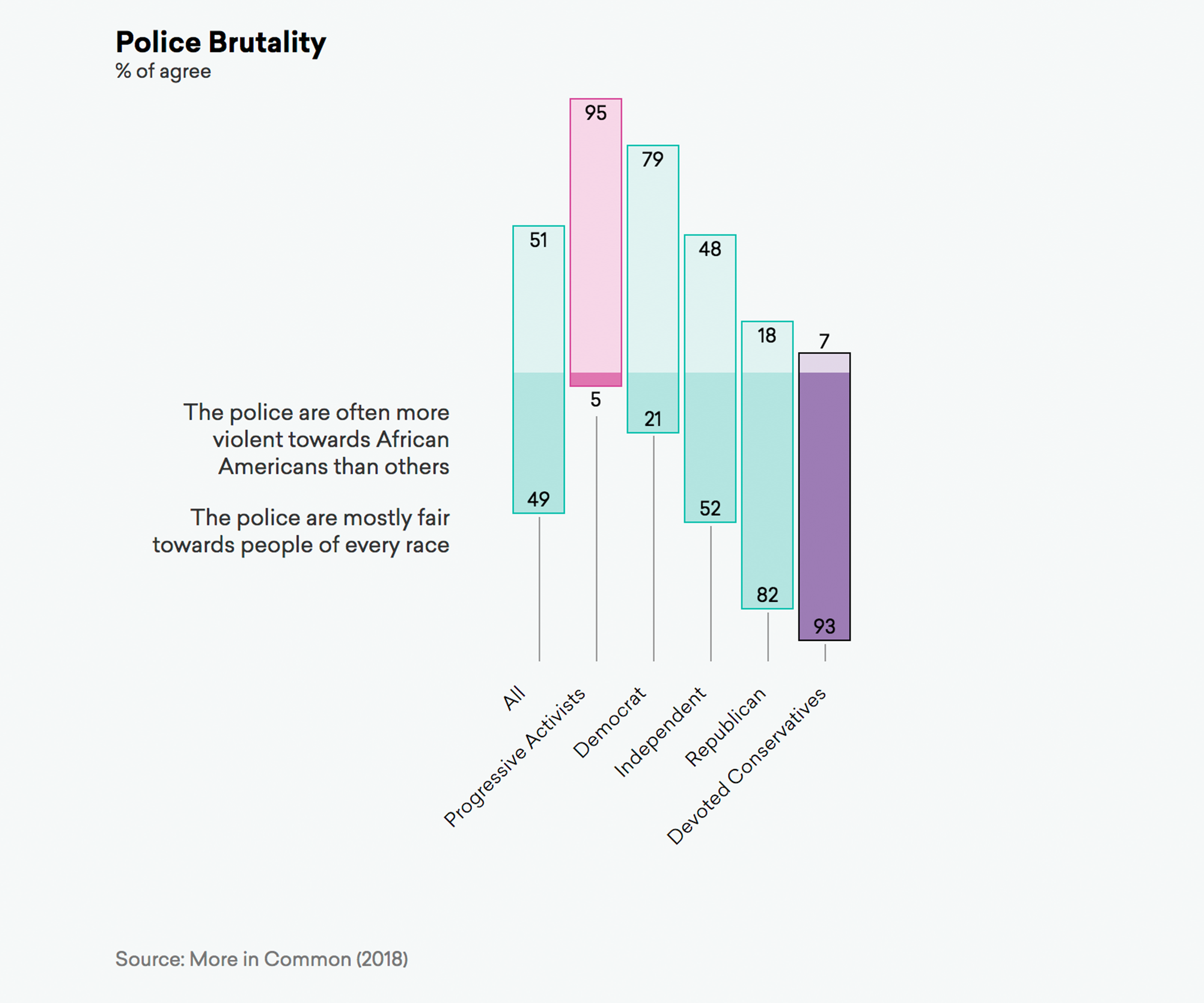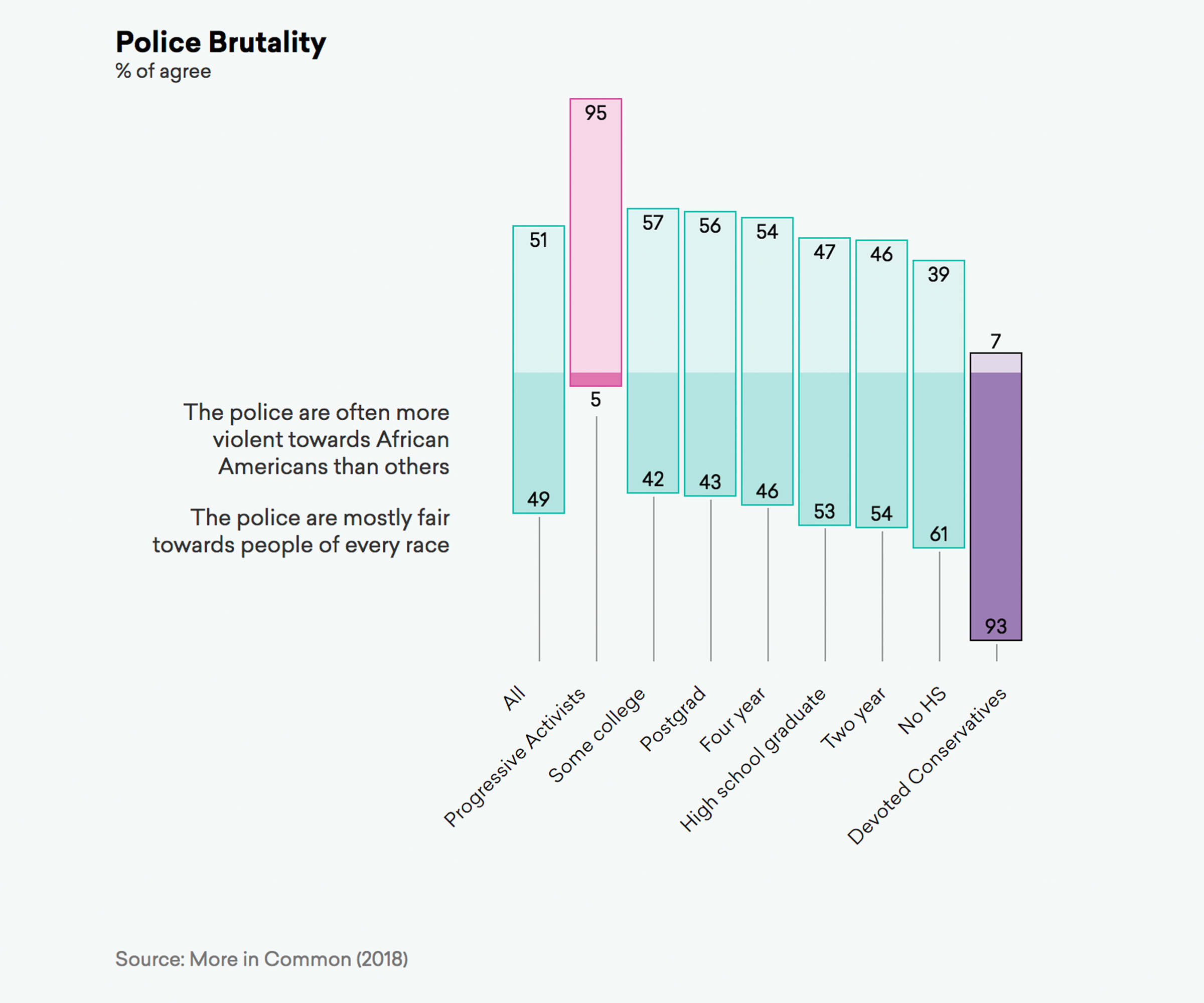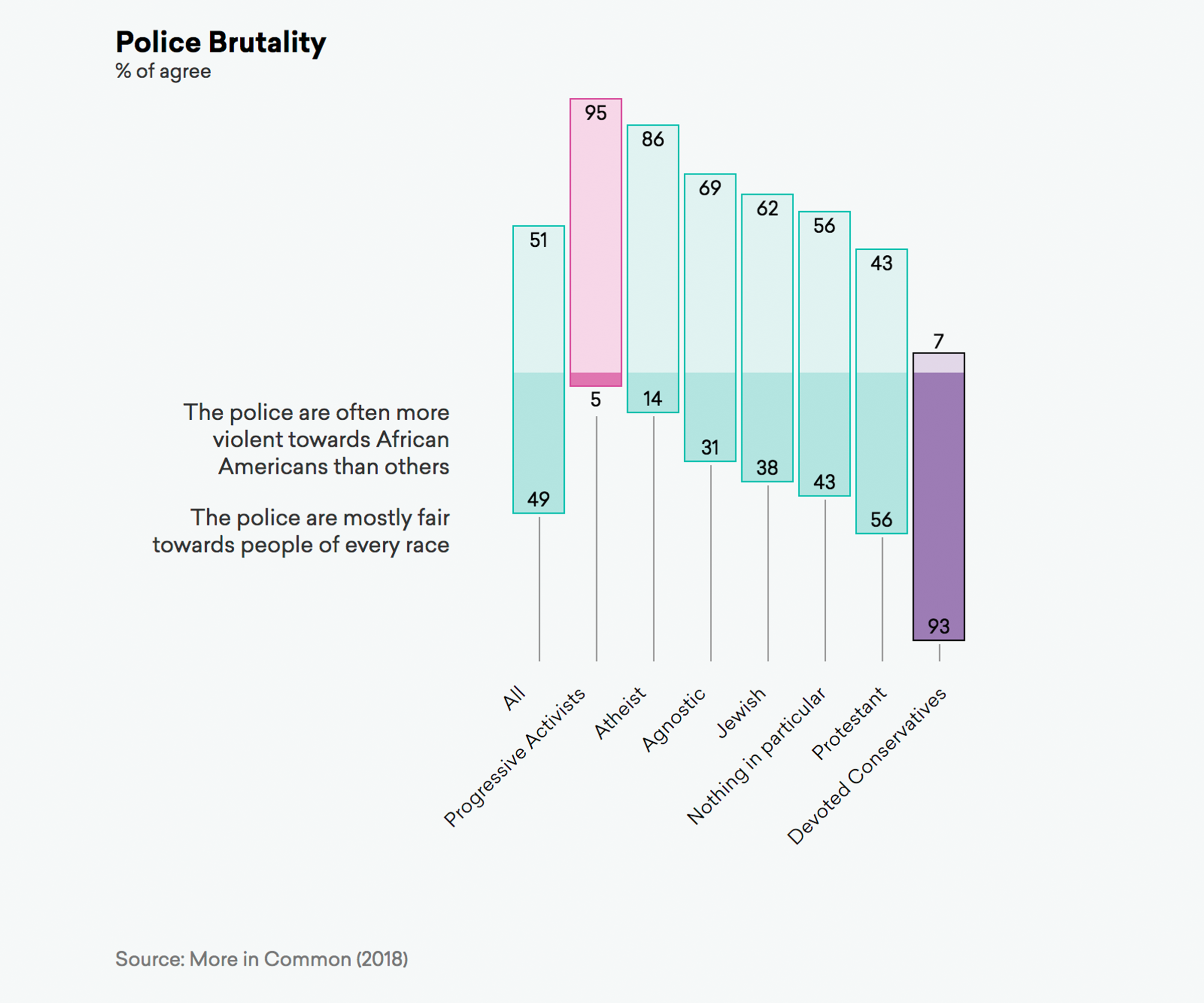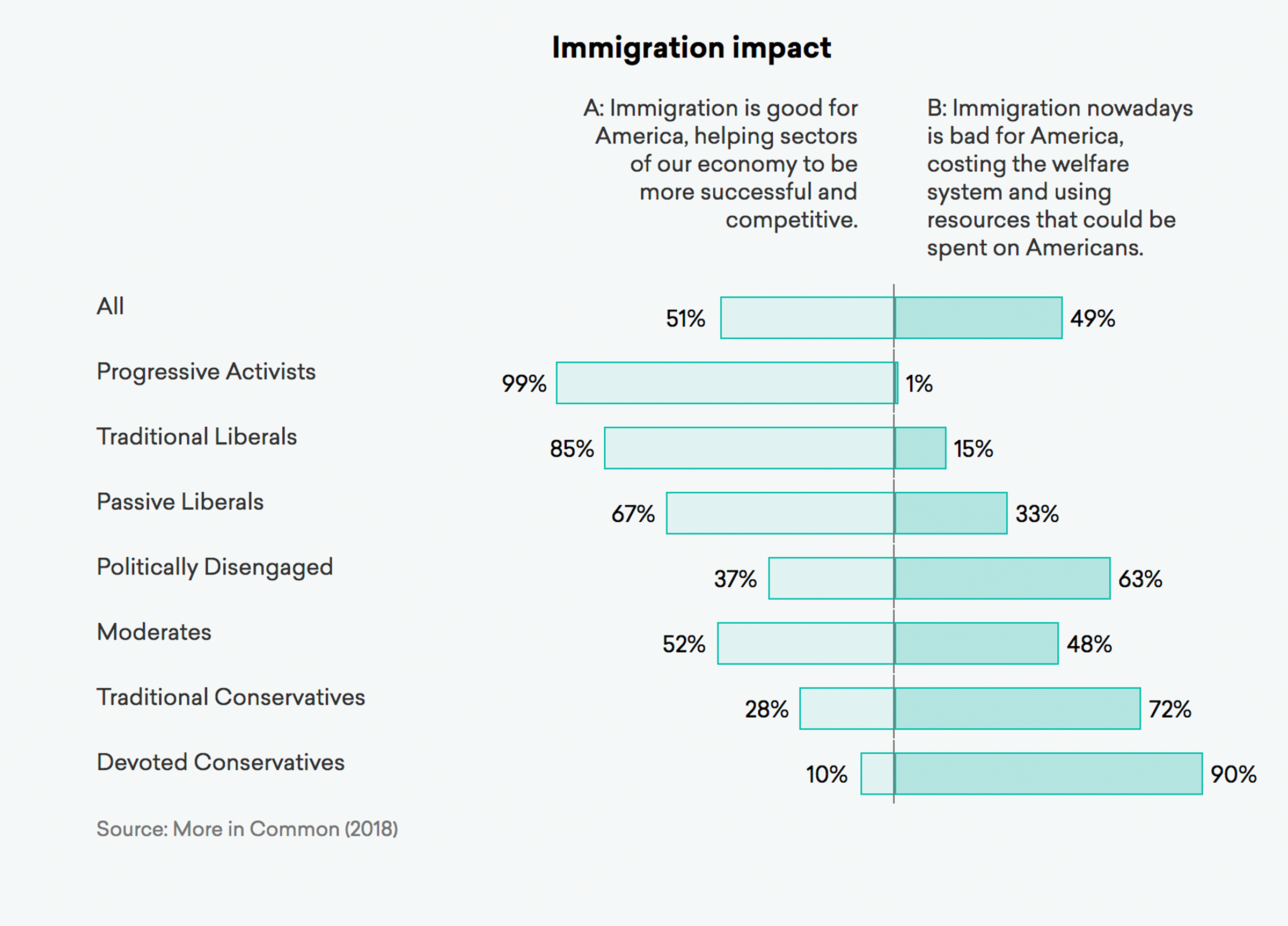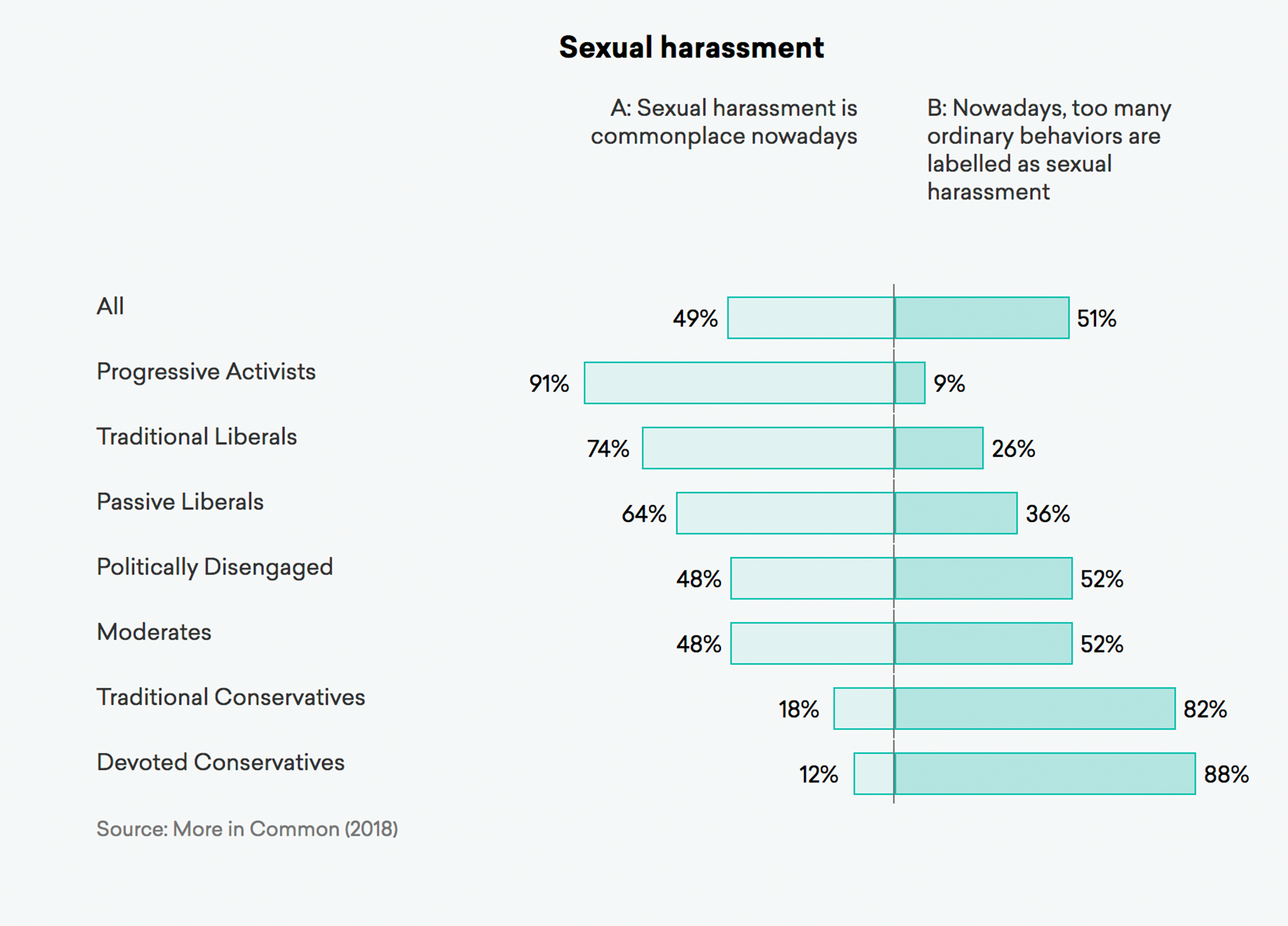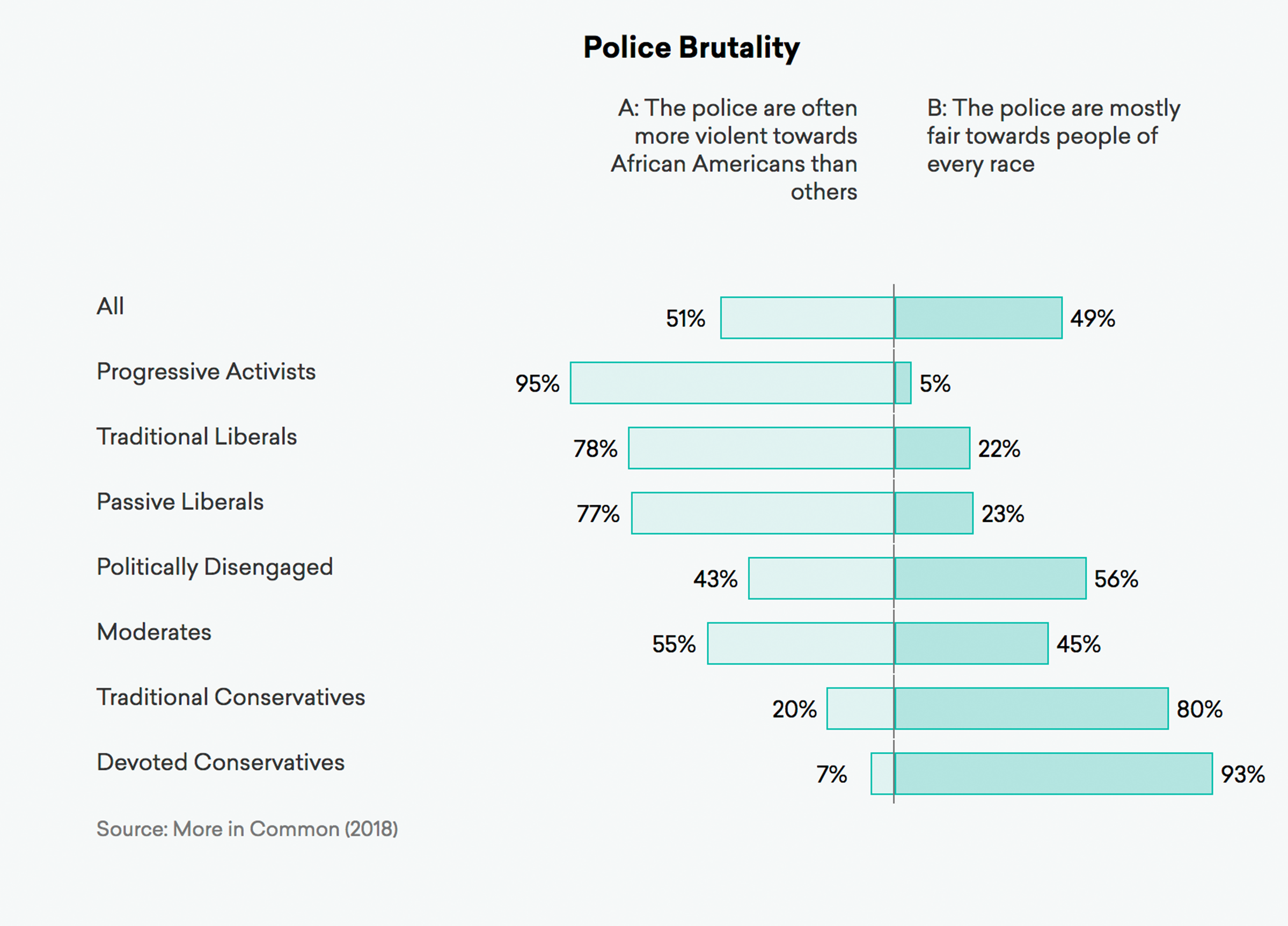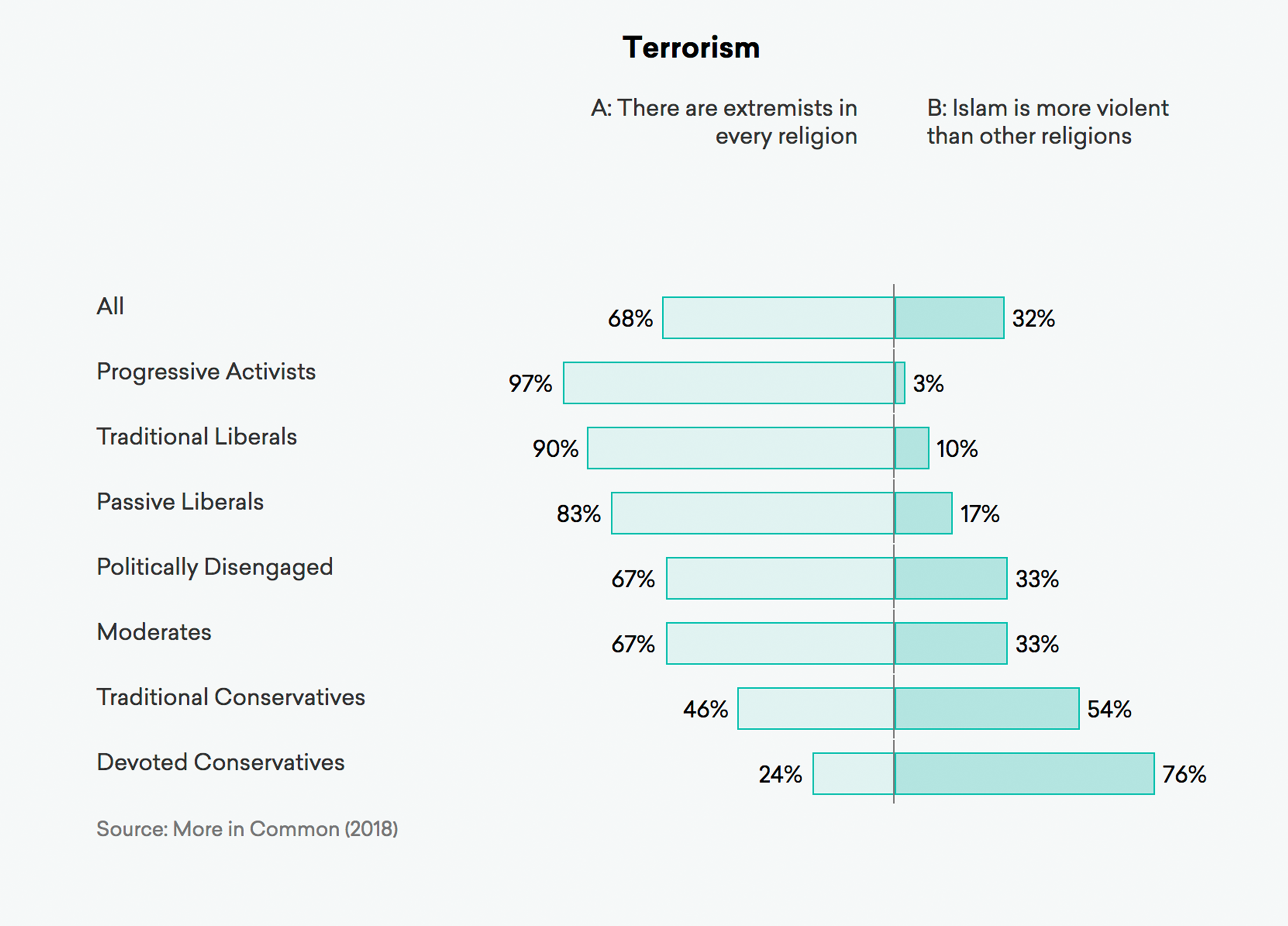Polarization
America has never felt so divided. Bitter debates that were once confined to Congressional hearings and cable TV have now found their way into every part of our lives, from our Facebook feeds to the family dinner table. But most Americans are tired of this "us-versus-them" mindset and are eager to find common ground. This is the message we’ve heard from more than 8,000 Americans in one of our country’s largest-ever studies of polarization: We hold dissimilar views on many issues. However, more than three in four Americans also believe that our differences aren’t so great that we can’t work together.
A Nation Divided
A range of major issues split the country
Our research concludes that we have become a set of tribes, with different codes, values, and even facts. In our public debates, it seems that we no longer just disagree. We reject each other’s premises and doubt each other’s motives. We question each other’s character. We block our ears to diverse perspectives. At home, polarization is souring personal relationships, ruining Thanksgiving dinners, and driving families apart.
We are experiencing these divisions in our workplaces, neighborhood groups, even our places of worship. In the media, pundits score points, mock opponents, and talk over each other. On the Internet, social media has become a hotbed of outrage, takedowns, and cruelty—often targeting total strangers.
But this can change. A majority of Americans, whom we’ve called the "Exhausted Majority," are fed up by America’s polarization. They know we have more in common than that which divides us: our belief in freedom, equality, and the pursuit of the American dream. They share a deep sense of gratitude that they are citizens of the United States. They want to move past our differences.
Turning the tide of tribalism is possible―but it won’t be easy. Americans have real differences and real disagreements with each other. We must be able to listen to each other to understand those differences and find common ground. That’s the focus of the Hidden Tribes project: to understand better what is pulling us apart, and find what can bring us back together.
The report that you can download here is the first part of More in Common's year-long Hidden Tribes project to understand our polarization and study what can reunite our fractured communities.
How we got here
Today's polarization reflects a perfect storm: Unsettling changes in our economy and society have left many Americans feeling like strangers in their own land. Old certainties are gone. The secure job, the growing wage, and the safety of neighborhood life where everyone knew each other—these all feel like relics of a bygone era. It feels as though hard work is no longer rewarded, and the gap between rich and poor widens every year.
Many Americans wonder who and what they can still trust. The institutions that once bound us are disappearing, and we no longer seem to have each other's backs. Everyone appears to have a varying version of world events, and it feels harder than ever to sort fact from fiction. Our news feeds seem to just echo our own views, and when people post alternative opinions they are often attacked by angry mobs. We don't seem to disagree anymore without perceiving another person's views as stupid, wrong or even evil. We're being played off each other; and told to see each other as threats and enemies, not Americans just like us but with separate experiences and views. The loudest and most extreme voices get heard, and others just feel like tuning out altogether.
Nobody wants simply to turn the clocks back, because there was a lot that wasn't right about the world of the past. Today, we seem more fractured and fragmented than anyone can remember. Instead of helping us find solutions to move us all forward, politics is driving us apart.
When people don't understand each other, they can't converse or find common ground. Yet somehow, if we could only press a "reset" button, it feels like things could be different and we could move forward together as a country.
Our Research Approach
The Hidden Tribes of America survey collected the views of more than 8,000 people, a group of US citizens statistically representative of the population based on census data. We also conducted six hour-long focus groups and 30 one-on-one interviews of at least one hour’s duration with people from across the seven population segments. Survey participants answered hundreds of questions about many of today’s most important issues and their hopes, fears and concerns for the future.
We also aimed to understand why people held the positions they did through a specially designed series of questions that helped us identify people’s core beliefs about the world―questions about their identity and the basic values and beliefs that influence the way people see the world. By focusing on core beliefs, we illuminated the hidden architecture that animates the lives and views of ordinary Americans.
We used an advanced statistical process called hierarchical clustering to identify groups of people with similar core beliefs. This revealed seven groups of Americans―what we call Hidden Tribes―with distinctive views and values. Our breakdown of Americans into groups is tied to how they express their core beliefs, which isn’t necessarily aligned with conventional demographic measures like age, gender, level of education, or ethnic background. The result is a unique portrait of the American public that we believe is both more revealing and more actionable than typical surveys.
Of course, public opinion research only tells a partial story. But the Hidden Tribes research is detailed, the sample is large, and our approach was open-ended. We were determined to let the data tell us about Americans organically, rather than proving pre-baked assumptions. The conclusion? A very different story than the tale of a deeply polarized America, split into two camps locked in a fight, determined to crush the other.
America's Hidden Tribes
America is not split into two tribes, as we're sometimes told. In fact, we've identified seven distinct groups of Americans. These are our Hidden Tribes of America: distinguished not by who they are or what they look like, but what they believe.
The Hidden Tribes of America
Here's a quick snapshot of each group:
Progressive Activists (8 percent of the population) are deeply concerned with issues concerning equity, fairness, and America's direction today. They tend to be more secular, cosmopolitan, and highly engaged with social media.
Traditional Liberals (11 percent of the population) tend to be cautious, rational, and idealistic. They value tolerance and compromise. They place great faith in institutions.
Passive Liberals (15 percent of the population) tend to feel isolated from their communities. They are insecure in their beliefs and try to avoid political conversations. They have a fatalistic view of politics and feel that the circumstances of their lives are beyond their control.
The Politically Disengaged (26 percent of the population) are untrusting, suspicious about external threats, conspiratorially minded, and pessimistic about progress. They tend to be patriotic yet detached from politics.
Moderates (15 percent of the population) are engaged in their communities, well informed, and civic-minded. Their faith is often an important part of their lives. They shy away from extremism of any sort.
Traditional Conservatives (19 percent of the population) tend to be religious, patriotic, and highly moralistic. They believe deeply in personal responsibility and self-reliance.
Devoted Conservatives (6 percent of the population) are deeply engaged with politics and hold strident, uncompromising views. They feel that America is embattled, and they perceive themselves as the last defenders of traditional values that are under threat.
Core Beliefs and Demographics
Tribe membership (pictured here: Progressive Activists and Devoted Conservatives) predicts how people think about political issues better than standard categories (such as "Liberal" or "Republican")
The Wings
Progressive Activists and Devoted Conservatives together comprise just 14 percent of the American population—yet it often feels as if our national conversation has become a shouting match between these two groups at the furthest ends of the spectrum. Together with Traditional Conservatives (who share values and tribalism like the Devoted Conservatives, just less intensely), they compose the 33 percent of people in the groups we label the Wings.
Combined, the members of these three tribes comprise just one-third of the population, but they often dominate our national conversation. Tribalism runs deep in their thinking. Their distrust and fear of the opposing side drives many of the people in these groups, and they have especially negative opinions of each other. When people today speak about how Americans seem to hate each other, they're usually talking about the opinions and behaviors of the Wings.
The Wings are also the most unified internally. On many of the most contentious issues—race, immigration, guns, LGBTQI+ rights—the people in these three tribes express high levels of unanimity. Often more than 90 percent of people in one of these groups holds the same view about a controversial issue, and typically, it will be the reverse of whatever the opposing wing believes. In contrast, the remaining two-thirds of Americans at the center show more diversity in their political views, express less certainty about them, and are more open to compromise and change—even on issues that we all tend to consider highly polarizing.
Why do the Wings dominate the conversation? A key reason is that polarization has become a business model. Media executives have realized that they can drive clicks, likes, and views, and make money for themselves and their shareholders, by providing people with the most strident opinions. This means that the most extreme voices―no matter how outlandish―often get the most airtime. In addition, people with the most extreme views are often the most certain of their positions. They are willing to argue with anyone and avoid moderating their opinions or conceding points to the other side. All this can make entertaining television and viral social media content. But it is distorting how we see each other, fracturing our society, and adding to distortions in our political system that give undue weight to the most extreme views.
Core Beliefs of the Wings Diverge Sharply
Devoted Conservatives emphasize traditional values and American identity, while Progressive Activists are defined by a rejection of traditional authority and a focus on rectifying historical injustices
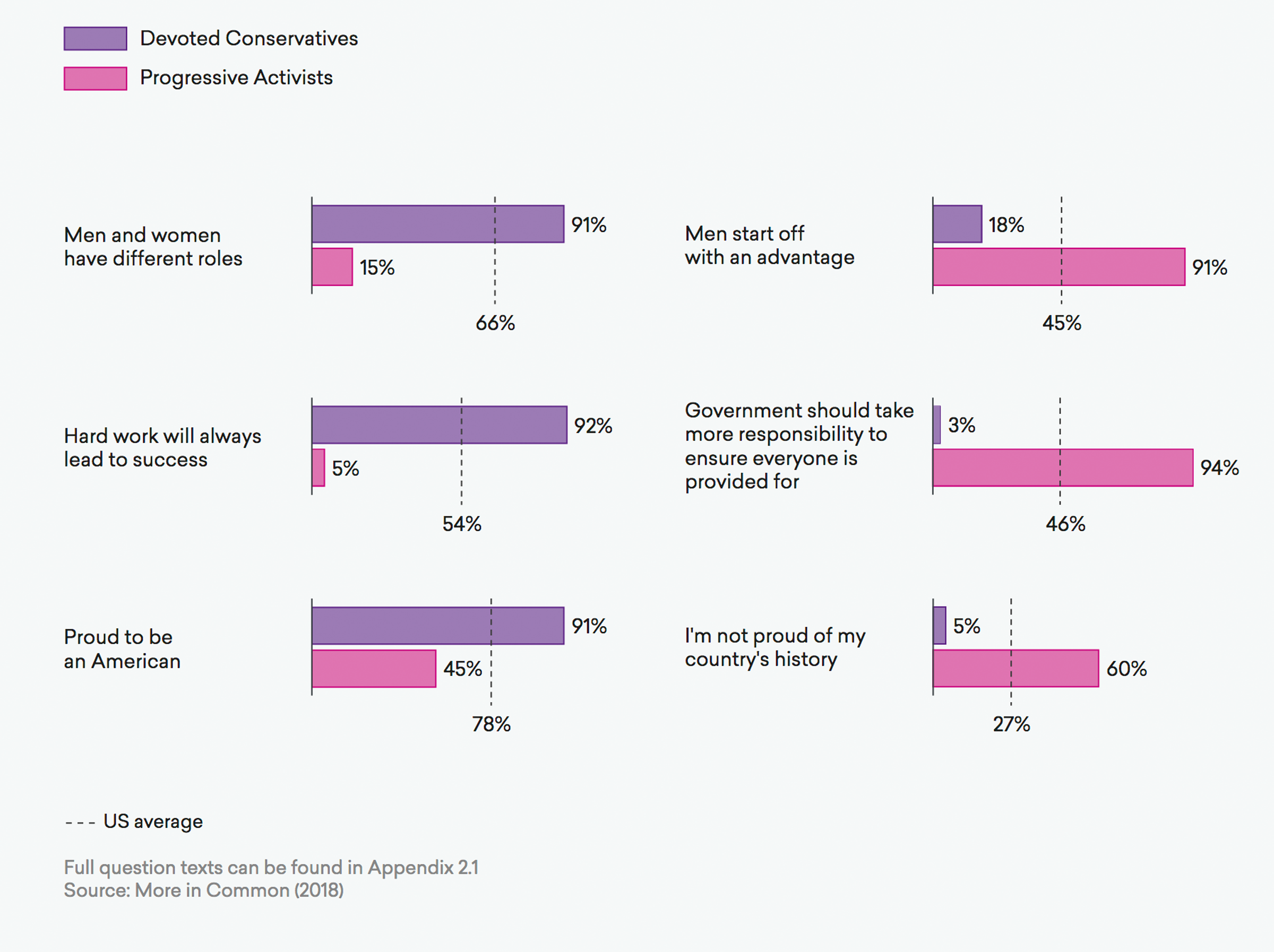
The Exhausted Majority
While the story of the Wings may be one of division and conflict, a very different story is found in the rest of America. In fact, the largest group that we uncovered in our research has so far been largely overlooked. It is a group of Americans we call the Exhausted Majority―our collective term for the four tribes, representing a two-thirds majority of Americans, who aren’t part of the Wings. Although they appear in the middle of our charts and graphs, most members of the Exhausted Majority aren’t political centrists or moderates. On specific issues, their views range across the spectrum. But while they hold a variety of views, the members of the Exhausted Majority are also united in important ways:
-
They are fed up with the polarization plaguing American government and society
-
They are often forgotten in the public discourse, overlooked because their voices are seldom heard
-
They are flexible in their views, willing to endorse different policies according to the precise situation rather than sticking ideologically to a single set of beliefs
-
They believe we can find common ground
The distinction between the Wings and the Exhausted Majority takes us beyond a simple story of the left and the right. Based on their strong views and values, we believe both Traditional Conservatives and Devoted Conservatives belong in the Wings. On the other side, Progressive Activists belong in the Wings, but Traditional Liberals belong in the Exhausted Majority. They have clear liberal views, but unlike the three Wings tribes, they have a more diverse range of opinions, seem more concerned about the country’s divisions, and are more committed to compromise.
While partisans argue and score political points, members of the Exhausted Majority are so frustrated with the bitter polarization of our politics that many have checked out completely, ceding the floor to more strident voices. This is especially true of Politically Disengaged and Passive Liberals, while Traditional Liberals and Moderates remain engaged. Members of the Exhausted Majority tend to be open to finding middle ground. Furthermore, they aren’t ideologues who dismiss as evil or ignorant the people who don’t share their exact political views. They want to talk and to find a path forward.
The Majority of Americans Want Compromise
Desire for compromise split by Wings and Exhausted Majority
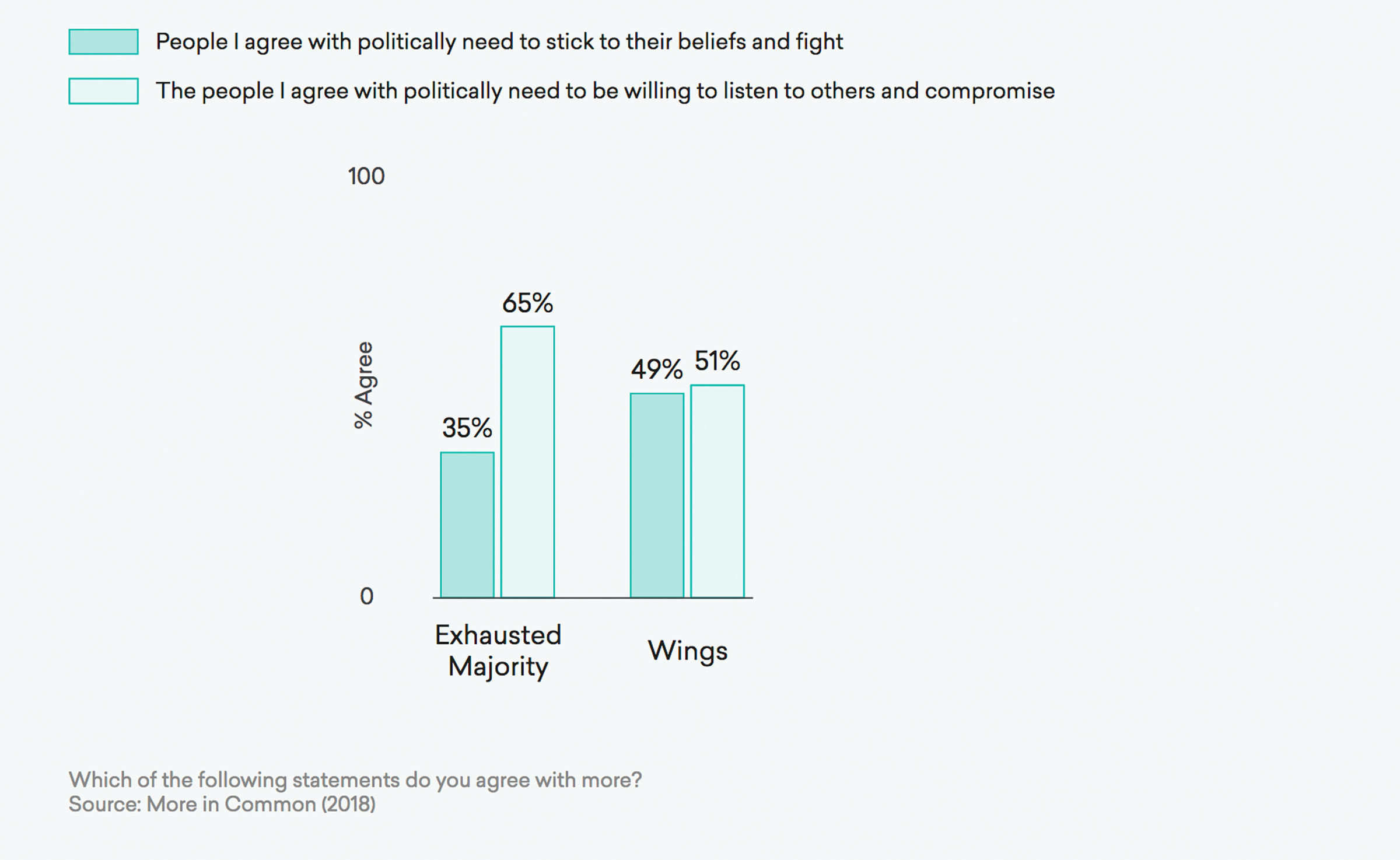
If we’re to reverse the tide of polarization, we need to listen once more to the Exhausted Majority. They feel discouraged by the country’s divisions, but they want to be heard and find a way out of them.
The Issues that Divide Us
The Hidden Tribes survey has collected over 200,000 pieces of information on the most pressing issues that frequently divide Americans, hence, it provides a new perspective on those issues. In short, we’re convinced that the Hidden Tribes and the powerful effect of tribalism can supply critical insights into public attitudes on many of our most controversial issues, like the following:
Immigration. Our research showed genuine tension between people’s desire for America to be open and inclusive and their desire for it to be safe and secure. One reason immigration provokes such heated debates is that opposing groups frame the issue in such dissimilar ways. For the two Conservative tribes, the Traditional Conservatives and the Devoted Conservatives, immigration is frequently framed as an issue of immigrants defying laws, the government losing control of borders, and doubts about immigrants’ loyalty to America. For the two liberal tribes (Progressive Activists and Traditional Liberals), the same immigration issues are perceived through the lens of racism, human rights, refugee protection, and the positive value of a diverse society. The views of the three remaining tribes diverge according to the issue at hand, but the Politically Disengaged are more suspicious of immigrants and more likely to support extreme measures to control borders than the other two tribes.
Racial justice and police brutality. The majority of all segments agree that race-related issues are at least somewhat serious and that racism is at least somewhat common. Furthermore, 60 percent of Americans believe that white supremacists are a growing threat in the United States. However, this broad agreement on the problem of racism does not extend to agreement on its symptoms or solution. For instance, 69 percent of Americans believe that we have become too sensitive to issues of race, and a near-unanimous 85 percent think that "race should not be a factor" in college admissions. Meaningful differences in viewpoint persist between white and black Americans on key questions, especially regarding police brutality towards African Americans. However, another crucially relevant factor is whether a person believes personal responsibility or circumstances are more relevant in shaping outcomes in life—a major fault line that divides conservatives from progressives. Those who attribute more importance to circumstance, a defining feature of Progressives Activists, are 30 percentage points more likely to believe that racism needs to be taken more seriously and that Black Lives Matter has brought attention to important issues.
Sex, gender, and morality. Gender identity, sexism, and sexual harassment are all controversial subjects in America today. While 69 percent of Americans consider sexism in the United States to be at least somewhat serious, nearly as many Americans—59 percent—also think people are too sensitive about matters relating to sexism and gender. The country is evenly divided between the progressive view that sexual harassment is still commonplace, and the conservative position that too many "ordinary behaviors" are now labelled as sexual harassment. And while both same-sex marriage and the acceptance of transgender people have the support of three in five Americans, this does not reflect an enthusiastic embrace of new norms towards sexuality. Indeed, more than half of Americans say that there is "pressure to think a certain way" about gay, lesbian and gender issues. More fundamentally, the country is evenly divided on whether our changes in attitudes towards sex and sexuality are making America "more accepting and tolerant" or whether they are simply causing "America to lose its moral foundation".
Terrorism and Islam. Americans' perceptions of the threat and causes of terrorism reflect the country's polarization. While 86 percent of Progressive Activists think Americans are too worried about terrorism, 84 percent of Devoted Conservatives believe Americans do not take terrorism seriously enough. In both instances, the wing segments are outliers. Progressive Activists are the only segment in which a majority thinks that the threat of terrorism is not that serious—a view they hold at three times the national average. Meanwhile, Devoted Conservatives are an outlier as the only group for whom a majority attributes terrorism to religion rather than to individuals: they are more than twice as likely to say that "some religions teach violence and extremism" rather than that "violent people use religion as a justification for their actions." Further, Devoted Conservatives are quite isolated in their particular fear of Islam: they are alone among the segments and twice as likely as the national average to believe that "Islam is the greatest threat to America".
Consistency Across Issues
Tribe membership shows strong reliability in predicting views across different political topics
The Hidden Architecture of Political Behavior
The Hidden Tribes shed light on our polarization by drawing on established scientific research to understand the basic motivations driving people’s behavior. Social scientists have long studied the underlying psychology of core beliefs and group identities― the fundamental ways we understand the world and align ourselves with others. Our core beliefs influence what we think, what we consider important, and how we act. The Hidden Tribes report is the first time this broad range of insights about core beliefs and tribalism have been the focus of a truly comprehensive national opinion survey. For this reason, we are confident it provides many new insights into the roots of our polarization.
The Hidden Tribes survey asked Americans about their underlying views and ways of seeing the world. The results help to explain why there is such a striking degree of coherence in how a person responds to seemingly unrelated issues: Core beliefs are the foundation of many of our views. Like a city building, our political outlook is built on a handful of pillars―our core beliefs and the groups we align with―that provide scaffolding for the rest of the structure.
Core Belief 1: Group Identity and Tribalism in America. Perhaps the most important aspect of the hidden architecture underlying political behavior is people's group identities. Social scientists have long recognized that people see their own groups as a strong source of self-esteem and a sense of belonging. Consequently, these tribal identities have significant influence over people’s views. This helps explain, for example, the popular social media post showing men in t-shirts that proudly proclaim “I’d rather be a Russian than Democrat.”
Through our questions, we measured several aspects of tribalism, including individuals’ pride in their group and the degree to which they believed their group members had a lot in common. Overall, we found the Wings showed far more tribalism than the middle groups. A strong relationship also exists between people’s pride in their racial group and certain other political opinions. For instance, white people with a strong racial identity are significantly more likely to believe that America needs a strong leader who is willing to break the rules or to decide that Confederate monuments are symbols of Southern pride.
Core Belief 2: Perceived Threat. People diverge in the amount of danger they perceive in the world. Some people see the world as a largely safe place with isolated pockets of violence. Others see the world as threatening, with isolated pockets of tranquility. To test people’s degree of perceived threat, the survey asked them how much they agree with the statement, "The world is becoming a more and more dangerous place." This basic sense of threat versus security is strongly correlated with people’s views on a wide variety of other issues, including immigration and terrorism. Progressive Activists also stand out from other groups as the most secure of any tribe by far. They view threats to their safety as fearmongering by their opponents, not a clear and present danger to their wellbeing. Simultaneously, Progressive Activists hold the most pessimistic views about the country's future.
Core Belief 3: Parenting Style and Authoritarianism. Recent research has found that people’s tendency towards authoritarianism―that is, their support for strong leaders and strict social hierarchy―is linked to their views on parenting style. For example, people who deem it more important for a child to be "well-behaved" than “creative” are more likely to endorse an authoritarian ethic. The Hidden Tribes report confirms those findings. How Americans view parenting closely tracks their views on many political issues. For example, people who endorsed a strict parenting style are more likely to oppose gay marriage, believe that America needs more faith and religion than reason and science, and worry about a decline in family values. These connections with parenting style are shown in the figure below.
Core Belief 4: Moral Foundations. Morality is about more than just equal treatment. The 2012 book The Righteous Mind by Jonathan Haidt, which provides important insights into the ways in which morality underlies political behavior, explains how morality is comprised of at least five pillars. These pillars, also called moral foundations, are:
-
Fairness/Cheating: Relating to proportionality, equality, reciprocity, and rendering justice according to shared rules.
-
Care/Harm: Protecting the vulnerable and helping those in need.
-
Authority/Subversion: Submitting to tradition and legitimate authority.
-
Purity/Disgust: Abhorrence for things that evoke disgust.
-
Loyalty/Betrayal: Standing with one’s group, family or nation.
We asked subjects a series of questions designed to assess how concerned they were with each of the five moral foundations in their moral judgments. Our results showed strong distinctions according to the various tribes. Progressive Activists and Traditional and Passive Liberals tended to care more about Harm and Fairness than the other foundations, while right-leaning groups such as Traditional and Devoted Conservatives cared about all five foundations.
Subjects' concern about each of the foundations closely tracks their views on other issues. For example, the degree to which people prioritize Loyalty strongly predicts the view that the Confederate flag symbolizes Southern pride, and people who prioritize Authority are most likely to support the Trump administration’s decision to ban travel from several Muslim-majority countries.
Shifts in the moral bedrock
Tribes differ in their endorsement of the moral foundations
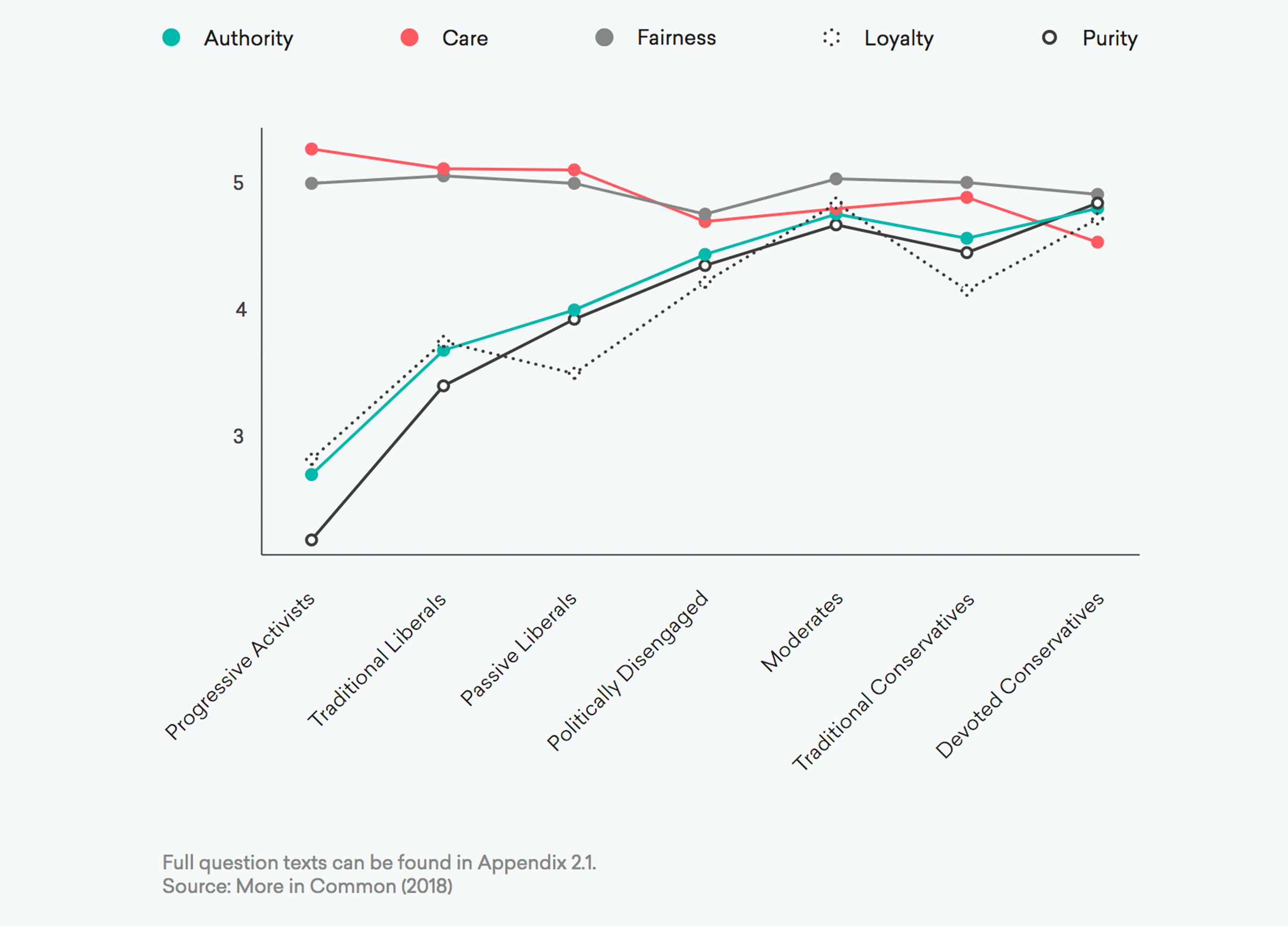
Core Belief 5: Personal Agency and Responsibility. People differ in whether they see life outcomes as being shaped more by individuals’ choices or social forces beyond their control. Conservatives tend to emphasize independence, responsibility and self-reliance, while liberals focus more on systemic injustices and collective responsibilities. Another way of conceptualizing this is that people tend to attribute life outcomes either to personal responsibility or to luck and circumstance. Some people believe that individuals should get credit for their successes because they were caused by factors within their control. Others believe that outcomes are mostly the result of external forces. These views have important implications. For example, the more people believe that luck played a role in life, the more likely they are to support Black Lives Matter activists. By contrast, people who believe that personal responsibility plays a bigger role are more than four times more likely to strongly approve of Donald Trump’s performance than those who believe that luck and circumstance did.
What Causes Success in Life?
Tribes differ in their views on the role of personal responsibility in life outcomes
Real Problems, Real Differences, But Real Common Ground
There is far more common ground among Americans than we might imagine, judging from the constant conflict among pundits, politicians, and social media users. This is true even on some of our most debated issues. The Hidden Tribes survey just scratched the surface on those issues.
For example, a full 81 percent of the population―including Devoted Conservatives, who tend to be the most skeptical when it comes to questions of race―agrees that racism continues to be an at least somewhat serious problem in the United States. The fact that the overwhelming majority of people acknowledge that racism is a real problem opens the door for continued conversations about how the country moves forward.
Another key area of agreement is the aspect of immigration policy regarding Dreamers: people brought to the United States illegally as children and given provisional legal status under the DACA program during the Obama administration. Three-quarters of all Americans believe there should be a pathway for these individuals to obtain citizenship through serving in the military or attending college. This exemplifies how the current polarization is leading to gridlock in American politics and preventing us from finding solutions supported by an overwhelming majority.
One issue that Americans from most tribes regularly discuss is how they feel that people have become too quick to take offense and criticize others’ use of language. Four out of five Americans believe "political correctness has gone too far in America"—a issue where most Americans with liberal views agree with Conservatives, again showing America is so much more than two tribes.
Our Shared Future
The Hidden Tribes study illuminates several new findings regarding America’s past, present, and future.
-
The American electorate is more complex than the oversimplified story of polarization would make us believe
-
The reason American society appears to be split 50/50 is that the loudest and most extreme viewpoints monopolize airtime and social media space
-
The majority of Americans, the Exhausted Majority, are frustrated and fed up with tribalism. They want to return to the mutual good faith and collaborative spirit that characterize a healthy democracy
-
Being able to discuss our genuine disagreements remains important. At the root of those disagreements are differences in core beliefs―the underlying psychological architecture that governs what we value and how we see the world
-
While our differences are often rooted in divergent views, that does not mean we cannot find common ground
-
By acknowledging and respecting the values that animate our beliefs, we can begin to restore a sense of respect and unity
-
The vast majority of Americans―three out of four―believe our differences are not so great that we cannot come together. Let’s make that a reality.

